#words I've lived by that were validated in post
Explore tagged Tumblr posts
Text
“In the end it’s only ever been one step, and then the next.”
― Ann Leckie, Ancillary Mercy
#ancillary mercy#imperial radch#ann leckie#q#save#for however many tomorrows#words I've lived by that were validated in post#it really does feel impossible sometimes#on living#fave#me @ past me we made it girl we really did it#I'm not alone anymore#ppl act like I'm cool and honestly they're probably right#I trust em and I trust me#clawing back everything I couldnt hold when I was younger#'preciate my friends love y'all#I'll see y'all tomorrow yeah?#you'll catch me out here#careening through life with the grace of a tsundere intergalactic battlecruiser
12 notes
·
View notes
Text
I saw a post earlier, I will not be appending my response to that post to the post itself, but I did want to touch upon it.
The post was about how trans men and transmasculine people afab don't have any media tropes that are, we'll say, problematic for them, the way that the 'funny man in a dress' trope is trans-misogynistic, I wanted to discuss that and lay that claim to rest.
Below I will be discussing some tropes in media that affect trans masculine people afab. Some may be worse than others, some accidental, some maybe on purpose, but I've compiled them because I think it's important to understand that just how the harmful tropes aimed at masculine people afab do exist, they just differ in their execution.
DISCLAIMER: If I have worded anything poorly in this post please tolerate it, English is my fourth language and it can be overwhelming to attempt linguistic perfection or the performance of it for native English Speaker.
EDIT: tumblr really messed my layout and formatting up, sorry for that but I'm not fixing it unless I really need to.
1. “Tomboy Gets a Makeover” = Suddenly She’s Worth Something (AKA: Now She’s Fuckable)
This one’s everywhere. You’ve got a character who’s rough around the edges, usually wears hoodies, maybe doesn’t shave, maybe doesn’t even care what people think. And the story punishes her for that. Until someone (usually a fairy godmother or mean girl turned ally) shoves her into a dress, puts some gloss on her lips, straightens her hair...
and then she’s finally seen as beautiful, desirable, and valid.
The core message? Your masculinity is temporary, and your value doesn’t actually exist until you conform to traditional femininity. You weren’t lovable, datable, or even visible until you softened up and got pretty.
This trope tells young people AFAB:
You're not enough unless you perform femininity
Your gender nonconformity is a flaw to fix
If you're not seen as sexy in the "right" way, you're invisible
And this sticks. Especially for transmascs, who grew up seeing their natural instincts or styles treated like a before picture.
Examples:
The Princess Diaries – Mia goes from “invisible frizzy nerd” to prom-queen level once her hair is flat and her legs are waxed.
A Cinderella Story – Sam’s baggy clothes are treated like a shield for her insecurity, until she shows up in a dress and suddenly earns male attention.
The Breakfast Club – Allison is artsy and weird and quietly masc... until she’s quite literally pink-washed and given a makeover so she can be datable.
She's All That – Laney is cool and self-possessed in her own way, but the movie waits until she’s in a red dress and contacts to take her seriously.
Meteor Garden – Shan Cai’s toughness is tolerable, but she’s still only framed as truly “lovable” after being softened through male attention.
✦•······················•✦•······················•✦
2. “She Pretended to Be a Boy” = She’s a Lying Snake Whore
When characters AFAB dress or live as boys, it’s almost always framed as deception. Not survival. Not autonomy. Not self-expression. Just trickery. There’s a dramatic “reveal” scene where everyone suddenly feels betrayed, like the character has been scheming the whole time instead of just…
living. Sound familiar?
This isn’t just about fiction. It directly echoes how transmasc people are treated in reality, as liars, as fake men, as threats to those around them just by existing. The idea that someone AFAB could be masculine, or just a guy, is treated like a trap set for unsuspecting cis people.
The underlying message:
You can’t be trusted if you present as masculine
Your gender is a mask, a trick, a crime
If people liked you before, they were duped
it’s the same logic used to justify violence and exclusion towards Transmasculine people AFAB in reality.
Examples:
She’s the Man – Viola pretends to be her brother to play soccer, but it’s all “uh-oh she has boobs” humor. Her gender presentation is the punchline.
The King’s Affection – She lives as the crown prince and does a damn good job, but the tension constantly hinges on whether she’s tricking people by being there at all. Masculinity is okay only if it’s secret and painful.
Coffee Prince – Go Eun-chan presents as male to get a job, and instead of critiquing the system that forces her to do it, the narrative focuses on her guilt and “the reveal.” Masculinity is tolerated, but never fully respected.
Victor/Victoria – Gender is treated as a clever disguise. The moment someone finds out “the truth,” it’s all shock, betrayal, and drama. Queerness framed as a con.
✦•······················•✦•······················•✦
3. “It’s Just a Phase” = You’ll Be a Real Girl™️ Eventually
You can be a tomboy for now. Run around, get messy, be loud. It’s even kind of cute! As a little kid who needs to grow up. Then suddenly, your masculinity isn’t just childish! it’s a problem. Something to “grow out of.” Something to fix!
This trope trains audiences to see AFAB masculinity as:
Immature
A quirk of childhood
A stepping stone to real femininity
And what does “real girlhood” mean in this context? Dresses. Lip gloss. Boys. The implication is that your value kicks in when you start performing the kind of femininity that makes you palatable and desirable. You were allowed to be wild for a minute, but only if you clean up nice later.
It reinforces the same tired message: Girlhood = destination, not a choice. Masculinity is just the wrong stop on the way. If you are Transmasculine AFAB, you are a child who should grow up, immature, being treated as much younger than they are is a huge issue with transmasculine people AFAB.
I would like to add that this is also a misogynistic trope, but misogyny intersects with transandrophobia in ways that are valid to talk about.
Examples:
The Parent Trap – Annie and Hallie are opposites, but Hallie (tomboy-coded) only really “settles down” and softens once she’s back with her mom. Her rougher edge is charming but temporary.
Now and Then – Roberta is the tomboy of the group, and her Big Moment of Growth™ comes when she puts on a dress. Not solving childhood trauma. Not emotional healing. The dress.
Boys Over Flowers – Jan-di is scrappy, resilient, athletic! and then she falls for the male lead and gradually loses every bit of that fire. By the end, she’s quiet, deferential, and soft. like that’s her natural arc.
Hi My Sweetheart– Rainie Yang’s character starts out masc-presenting and bold. She’s mocked, corrected, and eventually “fixed” into a soft, pink, cutesy girl. Her makeover isn’t for her. it’s the narrative giving her permission to be “dateable.”
✦•······················•✦•······················•✦
5. “One of the Boys” But Never Really One of the Boys
She’s tough. She’s cool. She fights. She hangs with the guys. She might even burp. But make no mistake! she’s never actually allowed to be one. This trope gives characters AFAB just enough masculinity to seem "interesting," then punishes them if they go too far with it.
Again, this is also a misogynistic trope, but the intersectionality here is important even in the ones that don't seem obvious, some people will poke fun at me putting Natasha here for example, but if you do that you're misunderstanding my intent and I do not care for it.
I am not saying ANY of these characters are coded transmasculine, I am discussing how masculinity is treated in regards to characters AFAB.
The message is clear: You can borrow masculinity, but don’t get comfortable in it.
These characters:
Get constant reminders that they're different
Are sexualized, softened, or sidelined the moment they get too close to “boyish”
Exist to complement the boys, not compete with them
Examples:
Avengers – Natasha Romanoff is deadly, competent, cool under pressure, but also constantly shoved into the “team mom” or “sexy redhead with feelings” role. Her backstory centers around forced sterilization, and her arc in Age of Ultron literally says she’s a “monster” for not being able to have kids. Tell me again how she’s treated like “one of the guys.”
How to Train Your Dragon – Astrid starts out as the alpha fighter, but as soon as Hiccup grows up, she becomes a background girlfriend with no arc of her own. Her sharp edge gets smoothed into supportiveness.
My Hero Academia – Nearly every tough AFAB character gets undercut. Mirko is badass but exists on the fringes. Jirou gets development, but only as support. Bakugo’s mom is comic relief. Meanwhile, male characters are allowed complex, messy, powerful arcs without ever needing to "soften" for the audience.
✦•······················•✦•······················•✦
“AFAB Character Learns to Embrace Womanhood” = Moral Victory!
You start with a tough, scrappy, masculine-coded person AFAB, maybe she fights, maybe she’s emotionally shut down, maybe she just doesn’t want to be like other girls. It doesn't matter, this is how it ends:
She softens. She submits. She “grows” by becoming a wife, a mom, a love interest, a Real Girl™️.
This isn’t healing. It’s containment. The message is: your rebellion was cute, but it’s time to settle down and accept the role assigned to you.
“Growth” = compliance. “Strength” = giving it up. “Maturity” = pink, dresses, and a baby carriage.
Examples:
The Hunger Games – Katniss Everdeen is trauma-coded, masc-leaning, and uncomfortable with romance or traditional femininity. So what’s her ending? A baby epilogue where she’s in a dress, quietly settled into nuclear family life. Is she happy about it? No, but there's no denying that this is her ending.
Mulan II– In the original, she challenges gender roles and becomes a literal war hero. In the sequel? The plot revolves around her needing to prove she can still be soft, feminine, and wife-material. Her masculinity is not allowed to just exist.
Jojo Rabbit – Rosie (the mother) is framed as the ideal woman: warm, loving, feminine. Meanwhile, Elsa (a girl in hiding) starts out guarded and hard-edged, but only becomes “redeemed” once she softens and embraces traditional femininity.
A Silent Voice / Koe no Katachi – The narrative constantly punishes her for not being “nice enough,” and her arc only begins to shift once she becomes more demure and apologetic. She cannot be both a good person and brash or hotheaded, submit or be branded evil.
Inuyasha – Sango is introduced as a demon-slaying warrior. But her story ends in the most vanilla way possible: marriage, motherhood, and sidelining. She loses her edge completely. I hate the end of Inuyasha so much it is borderline a meme in my circles.
Fruits Basket - Uotani is tall, tomboyish, and used to be in a girl gang. She has strength, history, and depth. And then her “big growth moment”? Realizing she wants to be softer and more ladylike, because femininity is treated as the finish line within the story.
✦•······················•✦•······················•✦
“Masculine Presentation” = Joke Costume or Moral Failure
When characters AFAB wear suits, cut their hair short, or pass as masc in any way, media rarely lets it land without a laugh track, or a moral consequence.
Masculine presentation is treated as:
A silly costume
A failed experiment
A sign of monstrosity
Or something to be shamed out of.
The story makes sure you feel embarrassed for them. It invites the audience to laugh, cringe, or judge, because “girl in boy clothes” is still a punchline in mainstream media. Just like 'Boy in girl clothes' is.
And yes, this hurts trans women, but it also absolutely targets butch, GNC, and transmasc folks. Masculinity is marked as wrong on AFAB bodies, funny if temporary, disgusting if permanent.
Examples:
Scooby-Doo – Velma’s masc coding (short hair, flat clothes, practical shoes) constantly becomes the joke. If she dresses even more masc? She’s “mistaken” for a man and ridiculed. Her queerness and presentation are treated like a quirk at best, a problem at worst.
The Suite Life of Zack and Cody – London Tipton wears a single masc outfit and the laugh track explodes. The outfit itself isn’t weird, but the show acts like the sight of her in anything non-feminine is a cosmic-level joke.
Friends – Rachel and Monica wear tuxedos in one episode, and the joke is entirely that it looks “wrong.” Chandler mocks them, the camera lingers on how “awkward” they look.
iCarly – Sam dresses masc semi-regularly, and is constantly mocked for acting “like a guy.” In interviews, actress Jennette McCurdy has said this ongoing joke contributed directly to her eating disorder relapse. This is not harmless.
Matilda - Miss Trunchbull is heavily masc-coded: big build, short hair, no makeup, harsh voice. She’s a literal villain, and her appearance is meant to be scary. Her masculinity is associated directly with her monstrosity.
Aikatsu! – Girls in suits are used as performance shock value. “Omg, a girl in a tuxedo??” is the whole joke.
✦•······················•✦•······················•✦
IN CLOSING.
These tropes don’t exist in a vacuum.
they shape how people see us, and how we see ourselves.
When characters AFAB exploring masculinity are only ever jokes, villains, phases, or tragedies, it sends a message: You don’t get to be this. You’re only allowed to visit. And when you're done, you better come back “correct.”
But we’re not punchlines. We’re not broken girls. Some of us are boys.
Some of us are neither.
Some of us are just butch as hell and happy about it.
We deserve stories where we aren’t corrected. Where masculinity on AFAB people isn’t a phase, a disguise, or a joke. But our lives, and the truth of them.
3K notes
·
View notes
Text
There's a post going around about a specific alleged AI fanfic. The author of the post lists a lot of reasons why they believe the fic is AI. Not linking to the post and not commenting on its conclusion, but.
But.
People.
These???? Are all ABSOLUTELY VALID analogies/expressions???
"her nimble fingers worked with quiet precision"
"his grip firm but tender"
"her gown pooling around her like embers"
But the post says that:
fingers don't make sound, so what does quiet precision mean? as opposed to what? her joints cracking with every movement? how is a grip firm but tender? what does that mean? since when do embers pool? the entire fic is littered with these adjectives that contradict each other or just straight up do not make sense, because all an ai does is generate descriptive language with no understanding of what the words it's spitting out actually mean
Come on, man. These are perfectly serviceable! Quiet precision and firm but tender are bog standard fictional expressions. Granted, I've never seen the simile of a dress pooling like embers, but I like it! It evokes!
They are absolutely something that an actual living breathing person would write! (In fact they're so serviceable that if the fic is AI they're probably plagiarised) (although firm but tender is SO common I'm not sure it can be plagiarised? It's like 'toeing off his shoes').
Like, yeah, AI sucks. I agree it sucks.
But analogies or expressions that aren't a one to one match for truth (reality? observable fact? whatever, you get what I mean) are not bad?? They don't mean a fic was written with AI?? They're what makes writing GOOD. Makes it interesting.
Sure, 'her nimble fingers moved like bones and tendons covered by skin because they were bones and tendons covered in skin, but her movements were so expertly precise that no one noticed just how super precise they were' might be entertaining. briefly.
But the whole POINT of metaphor and simile is to evoke a reaction. An emotion.
There's a post by silentwalrus that I cannot find (thanks tumblr search), and it's pissing me off, because they perfectly talked about this! About metaphor and how to write original and effective ones (something they're VERY good at). The example was something like 'he did a thing like a scorpion hidden under a bush' and pointing out that if you looked at it too close it didn't make sense, but it evoked a reaction.*
A clever or strange or evocative analogy or expression does not mean it was written by AI.
____________________________
*I may be misremembering the details, and if so I apologise; it was a long time ago, but I'm positive it involved a scorpion.
#AI#writing#fanfic#metaphor and simile are the bread and butter of fictional writing#not evidence of AI#dear lord
923 notes
·
View notes
Text
On radblr, in my early twenties, now what is likely 10 years ago (which, it's hard to remember when I started actually feminist positing on tumblr in earnest), I used to write about rape a lot more. I think my younger self felt invigorated not so much about the conversation of rape (of course, it's horrific), but by being angry and political about it. Being able to articulate complex, feminist ideas about rape, and have likeminded women engage. It felt intellectual and important, while a form of my own conscious raising. As I've aged, I find it harder. I can only say so many things, over and over again. It was never not hard, or depressing, or angering, but where the bad feelings once felt righteous and worth experiencing for the sake of speaking towards truth, now it can feel ineffective and exploitative.
I'm not saying one way is right, the other is wrong. I think (speaking broadly of course) that this is a part of aging. I think there is some truth about the patterns we see between young people and their thoughts and abilities, and then aging out of them. I think, speaking politically, younger and older activists need each other because two perspectives work in congress: the young passion that can be short sighted and ideological, and the elder pragmatism that can fall into complicity. These two perspectives together can be stronger than when apart. It's always more complicated than that, and each person is different, but I do think the trend of "I'm full of energy and angry and shocked and won't faulter" giving way to "I'm going to be measured and find priorities and perhaps become more lenient" is a general trend that is true. You get older and you realize both how short time is and how much longer you get to live it, and constant anger is not only exhausting, but it can be counterproductive. What's more, is that not only do your responsibilities increase, but some of those responsibilities also rub up against the very "machine" you used to rail against. You can achieve a lot with money, and to gain money you have to work. You gain money, you can start increasing your circle of influence, but then that increases the people you need to take care of. You need to take care of people, then you need to buy things. Suddenly, what seemed so easy being young and living off a shoestring budget 10 years ago seems irrational and dangerous today. I need to feed my dog, I need to help my sister, I can't expect my parents to live forever, I want to retire one day, I can bet on declining health...on and on. I'm speaking about myself in many ways, but I'm also trying to gesture to the larger trend generally. Extrapolate as it suits you, I think more of you than you realize will find yourself re-evaluating what actually isn't reconcilable as you get older. It's both hard to swallow and yet...like a toad in boiling water, you're almost not surprised looking back and realizing how much has changed and how right so many adults were when you were younger.
And so to this point, my intellectual posts about rape decreased. Never completely out of the fight, but being more specific about my time, my energy. Opting out of discussions that were too triggering, being more careful about my word choices. Understanding the harm that can come from being combative towards strangers on a public platform. Realizing that some periods of my life could be dedicated to enriching my life and creating enjoyment, and that meant certain things could be put on the backburner. Just because I wasn't writing, doesn't mean I wasn't thinking. I didn't need external validation (especially from strangers on tumblr) that my time was being well spent when it came to observing the news and thinking about it. I know what goes on in my head, putting it into a public post didn't make it more true. I'm not so sure I had the same belief at 22/23/24, etc. I think whether I would have articulated it that way, I think I felt like what went on in my head was meaningless unless it was being crafted into a message that had some sort of impact, with tumblr being my main platform to do that. I don't think that way now. I think my thoughts have value even if I keep them to myself, which means when I really have something I think is worth sharing on tumblr, I can craft it more precisely if and when I find the time. Or at least that's my goal as a 30-something, and I don't think that was as explicit of a goal as a 20-something who just wanted to get every thought down because it felt like my brain was being turned on for the first time.
But something that is coming into focus with the accusations of Gaiman that I haven't really reckoned with, or at least not as much as I have the past 24 hours & past 6 months, is that while I aged privately and passively by blog followed suit, is that the landscape of tumblr has evolved around me. I think there's a trick my brain has played on me: that at the end of the day, something of what I engaged with on radblr 10 years ago still exists. And, yes, to an extent, there are some women here I've followed for the entire time (but they have also aged...). But my followers have increased and decreased and increased and decreased with every stupid post that goes viral, and as I've aged and remained on tumblr, many many more women have aged and bowed out. It's becoming increasingly clear that I have a lot of young women following me who are not my age, and did not see those posts, mine and others. The "classics" that live large in my mind but weren't viral hits, just radblr discourses of the week. Some of these young women have a wildly different online experience than I did, and I think I knew but didn't know know the difference 10 years makes when growing up on the internet. I never had twitter, some of you are "twitter expats." I remember when youtube was people uploading 20 second home videos, some of you only know youtube as the long form video essay platform. I remember events like they were yesterday that are already erased in the public consciousness. Some of you were coming into your own during the "Me Too" movement and gave it so much credence, where I was not surprised nor expected much from it. Now I can see how we retroactively talk about it like it was such a bombshell, when most women I knew at the time, even "normie" women were, like, "yeah duh." I also haven't really reckoned with the fact that it's been long enough era of the "new algorithm" that there are (although young) full-grown adults who don't remember the internet before it.
The conversations I took for granted on tumblr are changing. To be sure, there are still a lot of women on tumblr who are likeminded to myself, making amazing posts that are good, true, & eye-opening. I'm not panicking that the "landscape" has changed so much that I can't recognize anything anyone says anymore, and that ""real"" feminism has dried up and disappeared when I stopped looking. But I want to say some things about rape that I believe are ideas that were shared between a collection of women that I deeply associated with on here a long time ago that maybe isn't explicitly talked about in these terms as frequently as I used to experience. I want to say some things that I used to say all the time that I think I assumed that "everyone knows" I say "these things" and "think these ways" - when maybe I haven't been so explicit in so long that people don't know, or haven't seen me speak these things before.
And so, some thoughts on rape:
Rape as a word is known to be an evil act, and therefore people (men and women) will speak of it as if they are against it. However, rape as it functions in our life is seen as a necessity. This is why people can speak out of two sides of their mouth about it. Rape is a concept of evil, but it is not an evil action. Why? Because women are meant to be raped. This is what's understood: women are inherently rape-able. Women are not sexual beings, they are sexual objects. They are incubators, and they create lust in men, which is what unravels the virture of men.
When a man rapes a women, the ultimate evil is that the man's virtue was corrupted, not the woman's. These ideas aren't explicitly articulated by anyone, but they are patterns at the heart of rape myths. It is a "shame" that a man "lost his will" because he happened across an "object" that "tricked him" into being "bestial", something that is ultimately excusable because man is beast. Is woman beast? No, she is not man.
If a man can resist, he is the paradigm of virtue; if he can't it's because she was too rape-able to remain virtuous. This is how men know they are rapists but don't agree they are rapists. They know they do the necessary action of raping, they disagree it's the same as the agreed upon concept of Rape. Rape that is evil is some monstrous other using these women as they are reserved for men.
When it suits men of a community, they can use this idea against other men they want to other. When it doesn't suit men, no man can be monstrous because all men are brothers, and so rape ceases to exist. You can't rape my daughter, unless you marry her, then do as you please. You can't rape madonnas, unless she is a whore, then do as you please. You can't rape my women, but if they're your women, do as you please. These ideas are not concrete convictions, they will morph to suit the man at the center of the rape accusation. A rapist who date-rapes might very well feel righteous anger when it happens to his sister. He can and will find a way to excuse whatever he did as part of some normal paradigm, a way he must act or should act, or a thing that is excusable for him. The inconsistency of this logic does not matter, because it does not suit him, and therefore does not suit male supremacy.
I say this all because, even though I'm appalled by the reaction of Gaiman's fans online, who are both men and women, and who can only fucking think of how they consume media (truly unbelievable and juvenile), I am simply not surprised. In so many ways, Gaiman's victims were rape-able, and that's why in so many ways his fans can readjust the variables of the situation and come up with some sort of conclusion of how it is rape, but it isn't Rape. Maybe she liked it sometimes, maybe she is misremembering. Maybe he was just confused on the terms of consent.
But what's more important to them is that they give credence to the idea that of course Rape is Evil, because they are good people who must think that way. What they're trying to convince themselves, and what can seem like they are speaking another language, is that this isn't Rape, this is rape. And so it's not that "she is misremembering" means she wasn't raped, but that she was raped in such a way that is the natural order of things. Man, who is a virtuous human and a beast, raped a sexual object who can only expect to exist so long in the world before tempting a man. This seems so obvious to most people. Feminists seem so intense and crazed, because they are centering something that is unnatural to most: a woman's experience as a human, not an object.
It comes natural to these fens to ask: "How can I enjoy my tv show knowing so many people think my hero is a capital R Rapist, when that's philosophical idea on evil and not a material reality, when I don't want people to think I don't take the capital R Rape idea as a serious evil." They are having two conversations in tandem. One is the idea that of course it's possible for Rape to exist, it's possible for some monstrous other to exist, but this man is not a monstrous other, because he is just a man. And men rape, that's just how it goes, because women are rape-able.
I'm condensing many ideas I have about rape into something simplified, for the sake of a tumblr post. And I got there in a circulus way, but I want to encourage the "old guard" who is still here, or women that agree with me above, that although they don't need to, if they have the time to speak more about rape as an intentional weapon against women, to do so. I think there are many ways the political conversation about rape for young women is first happening online, and I think the popular discourse is going sideways. A blind leading the blind moment. This is not a value judgement, but I'm gobsmacked at some things that are said as if they are "given" feminist talking points, that fall outside my understanding of rape as a feminist. Things like equalizing the complicity of Palmer with Gaiman's actions, rationalizing certain sexual proclivities as rooted in some innate sexuality, creating a hierarchy of which actions were worse for which victims, and so on. In many ways, also not surprising, par for the course for how feminism is generally spoken about. What is surprising to me is the confidence of speaking this way, and being convinced of their transgressive ideas. I think feminist online discourse must be so dire that the needle moving to some mid-point in a woman might convince her she's quite enlightened, when there's so much more she could learn. I think this idea that "libfems" are actually women who are clearly anti-feminist has convinced a lot of women that they are "good feminists" by engaging with ideas that are at odds at all with blatant conservatism, that it might be mystifying that they are quite centrist in comparison from many feminist talking points 10 to 20 years ago, at least as it appears to me. I'm speaking broadly, I know, but I had to get some thoughts down. Some angry part of me still exists and I do still feel the need to discuss rape, if only to show some young woman that there really is a deeply radical way you can think of rape that perhaps you hadn't thought of before.
As always, I'm open to critiques about anything in this post.
307 notes
·
View notes
Note
i've always felt uncomfortable with "all usamericans benefit from usamerican imperialism" not from the perspective of myself or such, but simply from the angle that i find myself uncomfortable stating that indigenous populations benefit from their own imperialist subjugation
i do not think i am informed enough on the topic to have a clear analysis though, is there anything you would be willing to offer thoughts on in the matter? essentially i am concerned as indigenous usamericans live in abominable conditions precisely because of the us existing and are denied self determination because of the existence of the us, and i know acquaintances to state the financials on the rez mirror that of imperialized nations in the global south, with such matters as a simple local food costing half a months wages and other such unbearable subjugation. is there information in such benefits that coexist with such subjugation, are there complexities such as passport access complicating the discussion and conveying benefits which must be acknowledged?
I get your hesitation, and usually I would feel the same way because most people who make these points mishandle their positions and spout some psuedo-maoist psuedo-third worldism which does in fact unfairly put the crux of marginalized people in themselves, but I read over the post I reblogged again, and found no such complaint to raise with it, though, of course, the language is very similar—perhaps some clarification is in order.
The very basic premise that every American citizen benefits from imperialism, minorities included is self-evidently, unfalsifiably, demonstrably true; to this, empire employs the macabre logic of a rising tide lifting all boats, in this analogy it would be appropriate to see the blood of subaltern as said tide.
You might sense here the tension, the contradiction, of class struggle; you might disavow Empire, and be for social revolution, but still remain hesitant to take this premise on its face, and maybe that's why you message me, this is all fine, do not worry. You are right in sensing this tension, to not readily embrace and defend nationalist arguments in the face of revolutionary analysis, but it seems to me that your hesitation is misguided, but not wrong, pointing towards something, but not sure where. In short, your tension comes not from recognizing that Empire benefits from the subaltern but by what Empire means: you hold onto the category of "citizen" or "citizenry" as a valid axis or venue of struggle, and idk if you recognize that.
See, the original post pointed out "USAmerican citizens", you maybe didn't see or appreciate this important category (tbf I doubt op realized it themselves but that's neither here nor there) since you didn't mention it in your ask, but it makes all the difference. "Citizen" is only a valid category in a republic, the last word of the State Socialists and of democrats; but this category exists on the precarious cliff leading into non-citizen, never in and by itself. And we know this because of the struggle around who gets to benefit from it and who gets punished by its repeal: criminals, outlaws and the uncivilized. A thing to remember here, since you brought up indigenous peoples, the rez, and their relation to the subaltern, is that the wars of colonization were fought as an explicit rejection of European —not just colonial— but rule wholesale as we read over Andrea's excellent article:
De Vitoria recognized the humanity of Indians, but still needed to find ways through which to justify the conquest of their lands and the Spanish possession of dominion over them. [..] If an Indian Nation refused the right of the Spanish to travel through their territory or refused the Spanish the right to trade with Indians, Indian Nations were acting against the Law of Nations, or ius gentium (278-284). Acting against ius gentium was to act against reason itself. This would render Indians “mad” and allow the Spanish to declare dominion over the land that Indians occupied. They could claim dominion because the Spanish were required to set up a civil society in order to teach the Indians how to be reasonable. In more direct terms, this meant that the Spanish had the right to intervene in the lives of Indians, an intervention that would result in the loss of tens of millions of lives. [..] Although de Vitoria asserted that Indians possessed reason, he then posited the possibility that “these barbarians, though not totally mad… are nevertheless so close to being mad, that they are unsuited to setting up or administering a commonwealth both legitimate and ordered in human and civil terms” (290). This would mean that [..] they lacked a basic precondition for ownership. Indians did not even have to break the law of nations, they could simply be found to be so deficient in reason that they lacked the ability to claim dominion over their land. [The Reds and the Rez: How Communists Fail Indigenous Nations]
Added to this one must also bear in mind Shoatz' own article:
[F]rom the 17th century until the abolition of slavery in the U.S., there were also Maroon communities in areas stretching from the pine barrens of New Jersey, down the east coast to Florida, and in the Appalachian mountains and later to migrate to Mexico’s northern border regions. The best known (but little studied) ones were those that occupied the dismal swamp of Virginia and North Carolina and the Seminoles of Florida [..] an ethnic group made up of Africans and Amerindians who came together to form the ethnicity: just like the Boni Maroons were formed in Suriname. [..] the descendents of the Seminoles in Mexico and the U.S. still fiercely guard their communities against the Mexican and U.S. governments: in Florida they’re recognized as a semi-autonomous tribe, and the Africans (Seminole negroes) in Oklahoma, Texas and Mexico also distinguish themselves from their neighbors – while calling Blacks in the U.S. ‘state negroes.’ According to New Afrikan nationalist cadre from the U.S. who have worked around them, the African Seminoles never considered themselves citizens of the U.S. like African-Americans do. [The Dragon and the Hydra, emphasis mine]
But this is better understood through Indigenous Action's most excellent article:
The genealogy of the Native vote is tied to boarding schools, Christian indoctrination, allotment programs, and global wars that established U.S. imperialism. U.S. assimilation policies were not designed as a benevolent form of harm reduction, they were an extension of a military strategy that couldn’t fulfill its genocidal programs. Citizenship was forced onto Indigenous Peoples as part of colonial strategy to, “Kill the Indian and save the man.” There was a time when Indigenous Peoples wanted nothing to do with U.S. citizenship and voting. [..] When the U.S. constitution was initially created, each state could determine who could be citizens at their discretion. Some states rarely granted citizenship and thereby conferred the status to select Indigenous Peoples but only if they dissolved their tribal relationships and became “civilized.” This typically meant that they renounced their tribal affiliation, paid taxes, and fully assimilated into white society. Alexandra Witkin writes in To Silence a Drum: The Imposition of United States Citizenship on Native Peoples, “Early citizenship policy rested upon the assumption that allegiance could only be given to one nation; thus peoples with an allegiance to a Native nation could not become citizens of the United States.” The preference though was not to respect and uphold Indigenous sovereignty, but to condemn it as “uncivilized” and undermine it through extreme tactics of forced assimilation. When the 14th Amendment to the U.S. Constitution was ratified in 1868, it granted citizenship only to men born or naturalized in the U.S., this included former slaves but was interpreted to not apply to Indigenous Peoples except for those who assimilated and paid taxes. The 15th Amendment was subsequently passed in 1870 to ensure the right of U.S. citizens to vote without discrimination of “race, color, or previous condition of servitude” but was still interpreted to exclude Indigenous Peoples who did not assimilate. In some ways this was an act of disenfranchisement, but more clearly it was a condition imposed upon Indigenous Peoples facing scorched-earth military campaigns and the threat of mass death marches to concentration camps. The message was clear, “assimilate or perish.”
[..] The U.S.’s genocidal military campaigns known collectively as the “Indian Wars” supposedly came to an end in 1924. That same year U.S. Congress passed the Indian Citizenship Act (ICA) which granted citizenship to Indigenous Peoples but still allowed for states to determine if they could vote. As a result, some states barred Indigenous Peoples from voting until 1957. Until passage of the ICA, which was a regulatory action approved with no hearings, Indigenous Peoples were considered “Domestic Subjects” of the U.S. Government. The Haudeneshonee Confederacy completely rejected imposition of U.S. citizenship through the IAC and called it an act of treason.
[..] Perhaps one of the clearest illustrations of assimilationist strategies regarding citizenship and voting comes from Henry S. Pancoast, one of the founders of the Christian white supremacist group, the Indian Rights Association (IRA). Pancoast stated, “Nothing [besides United States Citizenship] will so tend to assimilate the Indian and break up his narrow tribal allegiance, as making him feel that he has a distinct right and voice in the white man’s nation.” The IRA’s initial stated objective was to “bring about the complete civilization of the Indians and their admission to citizenship.” The IRA considered themselves reformists and successfully lobbied Congress to establish the boarding school system, pass the Dawes Act, reform the Bureau of Indian Affairs, and pass the Indian Reorganization Act of 1834. U.S. citizenship was imposed to destroy Indigenous sovereignty and facilitate mass-scale land theft. To this day, the “Native vote” is bound to assimilationist conditions that serve colonial interests.
This struggle metamorphozed under colonial rule into a twisted shadow of its former drive in its forced proximity to American society following its own internal logic, having its liberatory drive circumcised into seeking ameliorations within the system it once sought to overcome, and which in large parts still does. This is only natural of a defeated, cowed people beaten by an absolute magnimaty of power
It's not for nothing I've said before that, talking about October 7 in Palestine,
the weird thing about the pearl-clutching around civilians being attacked by an oppressed group seeking liberation is that, the category of “civilian” is already a violent one, doubly so when in the dress of a settler-colonial subject. “civilian” is not some prediscursive entity or subject that is removed from or comes anterior to State violence, it is in fact a result of State violence that then reproduces the State-violence that created it. To be a civilian is violence, violent even to the individual subject, the flesh-and-blood civilian one would talk about.
The violence done to the [..] civilians [..] [is] the direct result of the violence [done by their own] State. It is at the feet of colonialism that we must lay the blame and bodies of those hurt by decolonization.
to be a civilian is not to be “innocent”, contrary to popular opinion, nor to be dismarriaged from the violence of that position: simply to be at the forefront of where the violence against it will take place when all other alternatives have become exhausted, as we've seen in the latest developments happen in Palestine.
The category of "citizen" has been a resisted one, even in the US, by those who have always found freedom outside of it, from the maroons to every indigenous peoples; if the term "second class citizen" holds any weight, let it be recognized that it is in the State's reluctance to expand its ranks in favor of maintaining a greater pool of free [or at least cheaper] labor.
That being said, I hope you understand that I do not put the rez, for however much it's politic may or may not be assimilated, within the category of USAmerican, nor citizen, nor do I do the same with every other indigenous people born here or naturalized, such as our black brethren; I follow I deeper logic, that of decolonization.
With such a perspective, knowing history, I feel comfortable with this position, I hope this makes sense.
Pardon the late reply.
160 notes
·
View notes
Note
Hiii!
Several times lately you've said my personal weatherman is a comfort show.
You do realize it's an abusive relationship don't you?
I'm not sure why you would find comfort in abuse, but it may be something to reflect on or talk about with someone.
I say that with the upmost kindness.
Hello Anon!
I do love My Personal Weatherman. I take GREAT comfort in that show. It's not flawless by any means, but it makes my synapses buzz in the best possible way.
That doesn't mean it's a comfort show for everyone.
I am fully aware that many find Segasaki/Yoh's dynamic to be problematic or consider it an abusive relationship. If you see it that way, I can certainly understand why you wouldn't find it a comfort show. It's a valid response to that interpretation.
Before I go further, please know that I do not want to negate anyone's personal experiences or opinions in this post. You are more than welcome to disagree!
But on MY blog - I will defend these characters with everything in my being.
In short - I do NOT see it as an abusive relationship. I see it as two people figuring out how their life together is going to work. Which is HARD and ONGOING. Especially for two introverts who keep a lot of their thoughts in their heads. I feel that struggle in the core of my being.
Thanks to some of the subtitle/scripting issues, many people misinterpret how long they've "lived together". (That post has a pretty great timeline if you're interested.) They didn't start living together until Yoh graduated, and they've only been living together a few months. They are still learning a lot about each other and their relationship. Even if they'd been living together a long time, figuring life out together is a process. It's not an easy one.
Do I think either character is a green flag? ABSOLUTELY NOT.
Are they very flawed people? Yes.
Are they crap communicators? Yes.
Is there a power imbalance? Yes, but only when Yoh allows it. Yoh enjoys the power play. Yoh IS allowing it. No question in my mind on that score.
It's VERY important to realize that Yoh is the epitome of an unreliable narrator and partial viewpoints/perspectives are in play. For anyone not familiar with it, that means Yoh's perspective is misleading us to a degree in the early episodes. His words in particular cannot be trusted. Before someone comes at me about dismissing a character's words or belittling their feelings, this is an actual literary and narrative tool.
I love Yoh. He's processing best he can. He doesn't know the best words to use. He struggles to figure out what his emotions mean and how to read other people. Like most of us in life, he's figuring crap out.
And Segasaki is figuring his crap out too. But they're TRYING.
Now do I think their relationship is a role model for "BDSM" as it sometimes gets labeled? Please. Dear God. No. Just no. That requires GOOD communication and clear negotiation. See earlier point. They're crap at that...so very human.
However, I do think this is a lifestyle dominant/submissive relationship. By that I mean they have naturally fallen into these roles based on their personalities and preferences. It's more common than you might think, but that's probably an entirely different post.
Actually, if you're interested in the dominant/submissive aspect, LutaWolf had a whole series of posts about this show.
There is also a fabulous amount of language analysis for this show that dives into what the language usage says/depicts about their relationship.
And yes, I've read every one of those posts. Most of them multiple times. I read them when they were WROTE. I have an entire folder of posts about this show BOOKMARKED on my computer, because I didn't even have a Tumblr account at the time.
Where was I? Oh right - why I find comfort in it. Like many things I like or love, I don't really know. Why do I find pangolins adorable? Why do I love sweaters? Why do I enjoy asymmetrical earrings? I don't stress over it. I just accept that I love them.
Is it because I think the sexuality embedded and a rain soaked Yoh are BEAUTIFUL? I'm sure that is 100% part of it. It's a valid reason to indulge.
Is it possibly a result of me growing up in a hierarchical community with a heavy amount of toxic masculinity that I enjoy seeing dominant/submissive interactions? Maybe. That would not make my enjoyment of the show less valid.
Is it possibly a manifestation of untreated trauma or personal struggles of some kind? Maybe. That would not make my enjoyment of the show less valid.
Is it possible that I see either myself or my own relationship in their relationship at times? Yes, that is absolutely true. Still a valid reason to enjoy it.
Regardless, here's what I know without a doubt.
🍛
Segasaki eats the curry. Every. damn. time. And Yoh makes it. Every. damn. time.

There's an entire essay in why that's so very very important for both of them.
🔆
Yoh wants this relationship. Badly.



There's an entire essay in why I think that too.
🌀
Segasaki NEEDS Yoh. Yoh is his safe space. The one place he can relax and be himself.



There's an entire essay in that one too.
I haven't thought about this show just a little. I've lived and breathed in this show. I could write books on this show.
But frankly, feel free to worry about me if you want. If that's what you want to spend your energy on, have at it. I won't be stressing though. Because as much as I enjoy this show, Segasaki is not who I want.
I know the real dream when I see it.






It's Manju's husband. If only. Manju is the one living my dream here. Fully accepted for her nerdy, kinky, fangirl self.
189 notes
·
View notes
Text
El's Arc - "Pretty" to "Bitchin'"
tagging @gayofthefae and @hawkinsschoolcounselor bc their posts really help me with my analyses and i wouldn't be making posts without them xoxo
As I said in my post earlier, I have been rewatching seasons 1 and 2 and I've kind of pieced together some separate scenes of El to gather into this really interesting arc about her self-discovery and her self-image after leaving the lab. My guess is that the majority of this arc spans S1 and 2 and perfectly carries on into S3 and 4 where she really has her self-discovery arcs. Also keep in mind there are many many facets to her full character arc, and this is probably just one of many. I'm not an El expert per se, I've never analysed her this much in depth before, but I'll try my best :))
Also, this is not a pro-mileven post, in case you were wondering.
Basically, I've noticed that there are certain repeated words referring to El, and things that she keeps repeating in S1 and S2. From the beginning of S1 and sometimes in S2, she refers to things as "pretty". Later on, she stops referring to things as pretty and instead repeats the words "bitchin'" instead.
Basically, my guess is that pretty symbolically refers to her wishing she could be a normal girl, have a normal, non-lab childhood. Bitchin' refers to her embracing her powers and who she is as a person. At least by the end of S2 and in S3. By S4, she's using Bitchin' to impress Mike again, because she wants her powers back for him to love her again.
This arc is also tied to her wanting Mike to validate her as what she wants to be - a normal girl with a normal life. However, by the end of the arc in S2, she starts to become her own person.
Let's actually begin:


Here is the first mention of the word pretty.
She's referring to Nancy here, looking at the pictures on the mantle of Mike's family who live in the classic, nuclear family, normal lifestyle. She sees the good-girl daughter Nancy Wheeler, and calls her pretty. She isn't just simply calling her pretty though, to me, she's encapsulating everything she sees in this image.
A regular girl, with long neat hair, good clothes etc. El does not see herself as this in the slightest.
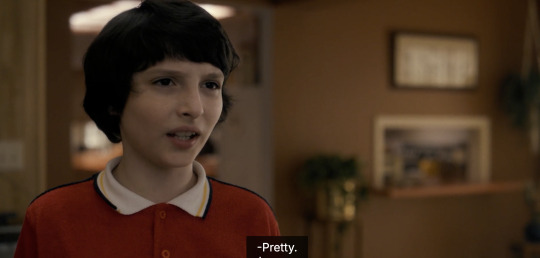
Mike's response is to say "I guess" - which makes sense because it's his sister and he's kind of annoyed by everything she does at the beginning of this season. Mike notes that El called her pretty.

The next, arguably the most important, scene is of El looking around Nancy's room. This scene has no other purpose other than to perpetuate this particular arc that she wants to be like Nancy, that she wants to have a normal childhood.
So far, the scenes of her looking around Mike's house have been her finding things that trigger a flashback to her childhood in the lab. This scene in Nancy's room is the last one where she's looking around the Wheeler house alone. The previous scenes which trigger her lab memories are showing her real childhood.
The Nancy's room scene shows the childhood she wishes she had.
The camera pans around Nancy's room, from El's perspective, who is looking at it in wonderment. So far, she's only seen Mike's room. This is a girl's room and she's a girl, so she's seeing what she wanted as a kid.
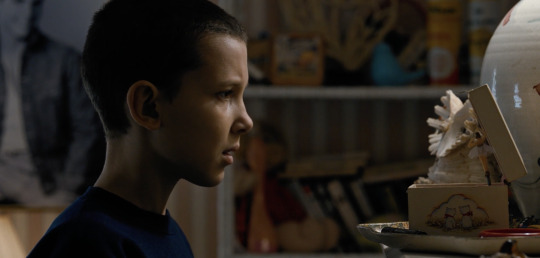
Here, she's getting emotional over a music box tune. Music box tunes often elicit themes of early childhood and infancy, also calmness and peace. Her getting emotional over it portrays that she's trying to remember something from her own infancy, but her infancy has never been as calming as a music box.
The music that plays in the background of this scene also has notes very similar to a music box. These musical motifs are often associated with "childhood, nostalgia or gentle, whimsical feelings".
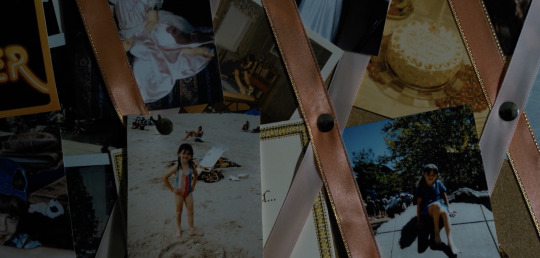

The next thing that is extremely important for this arc, is the fact that El gets very emotional over looking over pictures that Nancy has up in her room of her childhood. There are pictures of little Nancy looking happy, doing normal things, hanging with her best friend Barb, looking like the classic young girl with a happy childhood. El is clearly yearning for that in this scene after remembering so many awful things from her childhood.
This scene is the scene where she basically gains the desire to become Nancy - which is portrayed using the word pretty.
Also keep in mind that El probably knows how she looks - not like the typical girl. So when the boys suggest taking her to the middle school and Lucas says that they can't do that because....
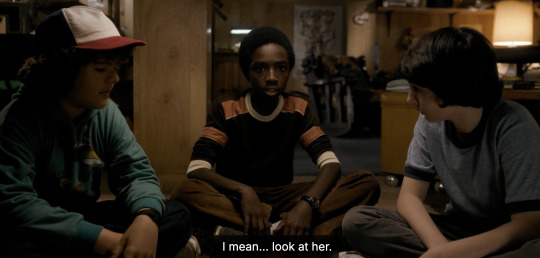
....of her appearance, this reinforces her idea of needing to look "pretty" in order to feel like a normal girl with a normal life.
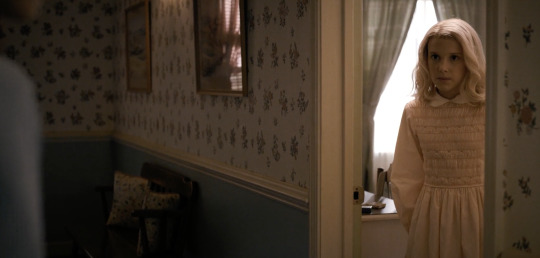
So she gets a make over by the boys - who are the ones to decide what they think makes a normal looking girl. Keep in mind that the make up and the dress and the wig were not her choices.

So after all this pining over Nancy's childhood and looking like Nancy - when Mike, the person who has taken care of her from the beginning of the season, the person who she's definitely attached to by now, calls her pretty - she must feel pretty gratified. She's achieved looking like a normal girl, even if it's just a costume. This isn't just about her looking like a girl that Mike finds pretty either, this is about her looking like Nancy. Who is his sister. Huh okay definitely romantic asf....

Eventually, Mike covers it up by saying pretty good, which El then decides to repeat into the mirror. She looks extremely emotional in this scene where she's looking at herself - and it's important that Mike is also seen in the mirror because, as we see later on, he becomes part of her desire to have a normal life. Part of her normal image.
After all, he's the one to give her a "normal" name: El. The first thing that gives her identity.
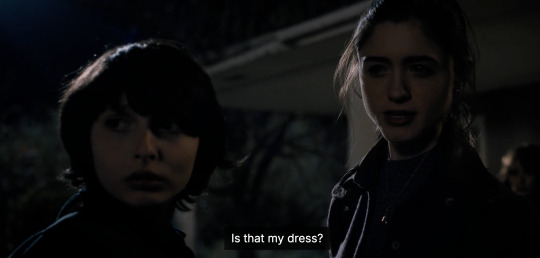
The most important thing to note here is that she is literally wearing Nancy's dress. The first interaction that El and Nancy have is about the fact that El is dressing up as her, which makes perfect sense.
Another strange thing to do with Mike kind of inadvertently referring to El as her family, which further gratifies El's desire to be a part of the normal Wheeler family, is the fact he calls her his cousin:
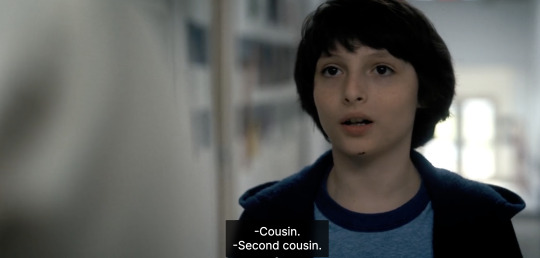
The next biggest turning point of her arc in S1 is when she uses her powers to harm somebody again - Lucas. This brings her mind back to the lab and her very abnormal childhood, especially when Mike says "What's wrong with you!" - basically showing that her using her powers for bad and not being the perfect normal girl is not what he wants. (Although this isn't actually why he says this, this is just how it looks to El). This is very clearly tied to her arc surrounding opening the UD gate, and feeling like she's a monster for doing this.
When she runs away, she roughens up her clothing and her wig. When she looks into a "mirror", the lake, and sees her true appearance and how wrong the wig looks now, she gets extremely angry at herself.
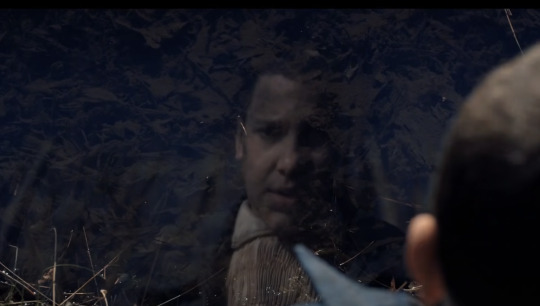

This encapsulates her arc perfectly because it shows the anger at herself for using her powers incorrectly, and shows the anger at herself for not actually looking or acting like a normal girl would - since the dress and the wig were always going to just be costume pieces. She's aware that she doesn't look like a regular girl, maybe she's even aware that she looks like a boy.
This idea keeps being perpetuated by many characters in the first season.

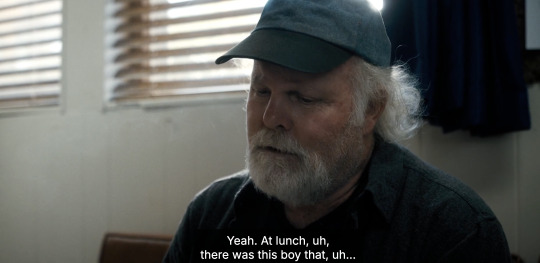

Which I'm sure just makes her feel more like a freak.
When El arrives back at home, again without the wig and with the dress all messed up and dirty, she looks again to Mike for that reassurance that she is still normal even without the costuming.
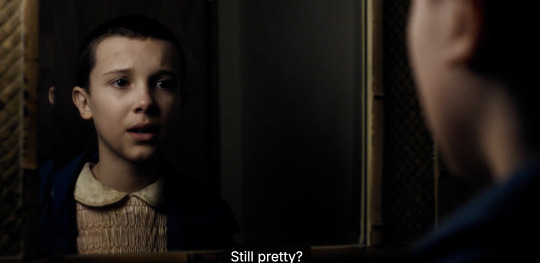
To me, this is not romantic, and none of the times that he calls her pretty or her wanting him to call her that are. This is her wanting reassurance that she is just a normal girl still, due to her trauma, even though Mike has surely reassured her that she's not a monster. So when he says, albeit weirdly, that she's still pretty (because he wants her to be happy, as you can tell by his tone), she looks back at the mirror, emotional and smiling. This greatly contrasts to her looking in the lake and screaming at her reflection.
She needs Mike to feel normal - just like he needs her to feel normal oh! Twinning <3
Basically, we've established that she believes she wants to be a part of the Wheeler family to feel normal and like she has a normal childhood. Mike is very much part of that picture. This is reinforced when he paints a picture of her perfect ideal scenario of living a normal life when all the upside down stuff is over:
Mike: "My mom, she's a pretty awesome cook. She can make you whatever you like... Well, yeah, Eggos but real food too." *Sighs* "See, I was thinking, once all of this is over and Will's back and you're not a secret anymore, my parents can get you an actual bed for the basement... My point is, they'll take care of you. They'll be like your new parents, and Nancy will be like your new sister."
El:
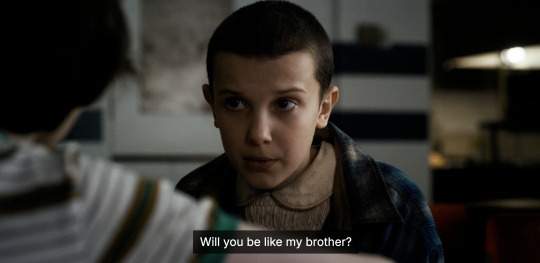
She doesn't know her feelings. If she knows what romantic feelings are anyways, she clearly doesn't feel any here, otherwise she would make a disgusted face rather than a curious one. After Mike refuses this idea, that's when she seems legitimately disappointed, because he's taking away her chance at what she wants:
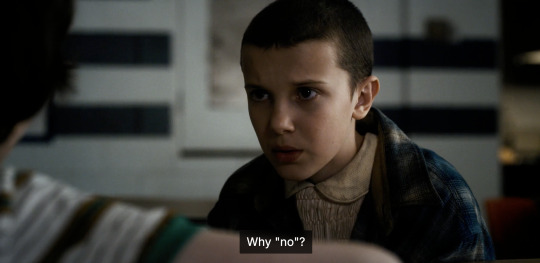
No matter what you say about Mike's behaviour in this scene, this is not romantic at all. oh my god - she literally doesn't think that there's a possibility for romance here. She's being presented as this naive "born sexy yesterday trope" nonsense, I hate it when people think this scene is super cute. I mean yeah, it might be innocent, but innocent in this icky way i cant even-
She ends up pressing him for an answer, and this is where she gets a new idea of a normal girl life: being taken to the Snow Ball by Mike. Being taken to a dance at a school seems like a very normal girl, normal childhood thing to do. She just wants a life where she's not this lab creature she thinks she is, and Mike is providing her with that.
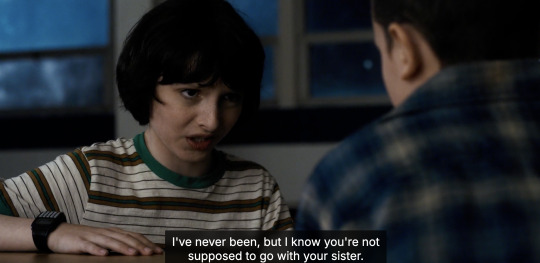
This is how Mike Wheeler explains that incest is wrong guys
Also El keeps pressing and says "No? You can't?" and it's like she keeps wanting to be his sister and getting confused whenever he takes that away from her 😭
When El then asks Mike what he means, he says that you don't even go with a friend, but he never actually says that he likes her, and just decides to kiss her - which he expects her to understand as a romantic gesture I guess. She doesn't know. All she knows is that Mike thinks she's special, Mike is going to help her feel normal and have a normal life.
He is the image of a normal life.
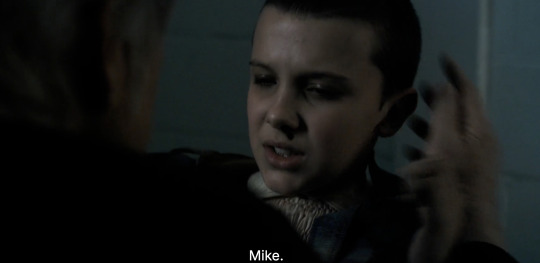
So when she almost gets captured again by the abusive father figure that made her feel like a monster, the one who raised her in a lab where she feels like a fucking experiment, of course she is going to reach for Mike, who is her chance at a normal life. Reaching away from one familial figure to the next.
^^ This bit isn't simply her reaching for someone she trusts or loves, it's about her desperately trying to claw her way back to her only chance at safety.
Then we have the scene that basically confirms this whole thing 100 times over:
Mike: "The bad man's gone. We'll be home soon and my mom...she'll get you your own bed. You can eat as many Eggos as you want....... And we can go to the Snow Ball."
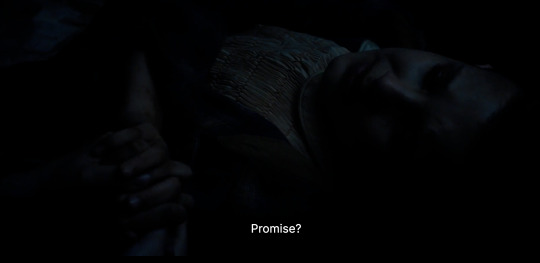
She wants this life. This isn't just about her wanting to be romantic with Mike - the writers didn't just have Mike say about the Snow Ball. They had him promise all the other desirable, familial things that El wants too. She wants him to promise that he will give her a normal life, and he does.
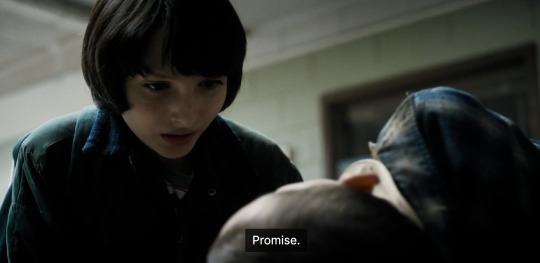
Could go on a complete tangent about how "Promises" are presented as something that can never ever be broken by Mike - meaning Mike gets trapped in this loop over and over of knowing that he's promised El a normal life. Even if his own feelings change, he has promised to provide her normalcy. Oof.
Onto Season 2. This theme of familial love and found family is very much carried on into Season 2, but not in the same way. El has sacrificed herself at the end of Season 1, and has tried to return to the Wheeler household, only to find that she is not welcome.
El is then trapped by Hopper. She shows a desire not just to leave to see Mike, but she shows a desire to leave to go trick or treating, aka the most normal childhood thing to do on Halloween. She just wants to be a kid like everyone else. Meaning, whenever she wants to leave to see Mike, she's trying to leave to have a normal life.
(Also, she only learns how to have a romantic relationship through Romcoms and dramatic romances on TV. Not through her own desires. Her relationship with Mike isn't part of her self-discovery journey, it's an obstacle)
For me, this desire for normalcy is basically proven in the fact that when she finds out there is ANOTHER chance at having a normal life (through finding her mother) she completely abandons the Mike thing and decides to go through that route instead. This is also likely because she keeps trying to contact Mike, but he never sees her, and when she goes to the school, she believes he's moved on without her. So she gives up and takes another route to normalcy.
Now for the moment that inspired this whole post. I just really needed to get out my thoughts about this:
El looks around what was supposed to be her childhood bedroom. Paralleling the scene in S1 where she looks around Nancy's room, yearning for a normal childhood.
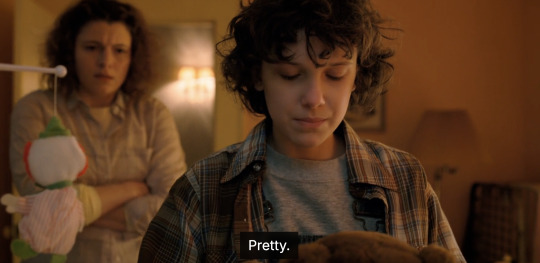
PRETTY.
This is definitive proof that the word "pretty" has nothing to do with her wanting to be called beautiful by Mike or something. She's not just calling a teddy bear pretty. She's reminiscing on her old desires to be like Nancy. She reminiscing on her old desires for a normal childhood. She's thinking about the possibility of if she was never taken to the lab, she would have been in this bedroom.
The way she says it too, it's with this sad tone. Like she's kind of resigning herself to actually not having a normal life - seeing as she's arrived to her one chance at it and seeing that her mother is unresponsive.
"Bitchin'"
This season is where we fully see El embrace her powers. We all love to hate on Episode 7 of Season 2, but it's actually really really important to her character. We see her be scared that Brenner is back and ready to take her home to her abnormal childhood. We see her channeling her anger. We see her come to embrace what makes her different.
When she comes back, she looks completely different. But not in a "normal" way. She looks......
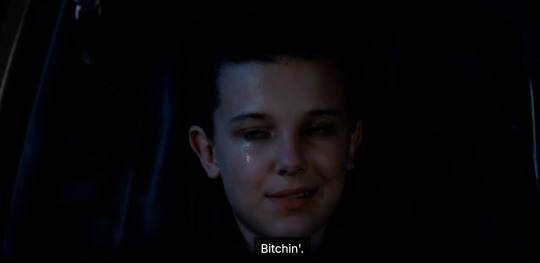
No longer pretty - aka normal. She's embracing her powers and her true self. Hopper also backs this up - it's important that he is the first person to embrace this because earlier in the season, he was the one to stifle her true self.
This word is then further associated with her finding herself in Season 3, which is where she kind of regresses back into not knowing who she is at the start of the season. She defines herself as Mike's girlfriend, and he's basically the only person she sees. The reason for this? He's the only one that makes her feel normal and happy. If someone out there calls this super romantic and not signs of an insecure attachment I'll throw my psychology degree hands okay
After she hangs out with Max, she no longer thinks she needs Mike. Max is now the one that makes her feel good - she's the one that doesn't just make her feel normal, but makes her feel free.
When El tarts becoming her own person, and in this season she really really embraces her powers, she calls herself this word again:
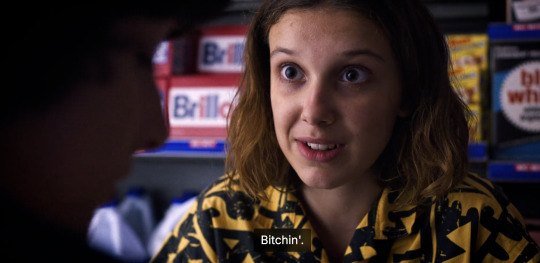

In some ways, I think this is just fan service to the line in Season 2 LMAO because S3 was ripe with fan service but I can really see this as just being her looking for validation for her new self from Mike again. Her being a "badass' superhero is what he puts on a pedestal. Her powers are important to her sense of self, and when someone that you are attached to puts you on that pedestal because of your powers..... well.....
When those powers are taken away, you feel the need to create a new version of yourself.
And Season 4 is where El reinvents herself and regresses backwards in her arc. She's, yet again, trying to create the normal girl, normal life. She knows that Mike had put her on a pedestal for having super powers, and she's afraid that if her powers aren't good enough for him, and if she shows flaws when she has no powers, then he'll view her as a monster.
This all stems back to her original storyline in Season 1. See, it all comes full circle.
Now, back to this word. Pretty is no longer used. But bitchin' takes on a new meaning. It is the new "pretty".
El seeks validation from Mike again, wanting to seem like she has a normal life, a cool life that he desires and something that he'll show love for. She needs him to like this idealised version of her without flaws, with friends and good grades and someone who goes to fun parties at a roller rink:

Then we see El go through her Season 4 arc which I just cannot begin to summarise, but I'll try to show what it means for this metaphor of her needing Mike to validate her:
Mike finds out about her lies, but she hides from him and refuses his initial comfort. She then acts violently and very out of the line from her idealised version she created.
The way he reacts reminds her of her old, abusive father figure who made her feel like an experiment. (again links to the old S1 arc)
Mike then refuses to talk to her, making her believe that he views her as a monster. She already thinks that he doesn't love her anymore because of the no powers thing.
He calls her a 'superhero' despite her really not feeling like one.
She throws the words back at Mike in a note later. Basically telling him that she no longer needs him to tell her that she's a superhero for her to feel like one.
In the lab, she figures out that she was never the monster. This is extremely important because she does this without needing Mike to tell her that he loves her.
When Mike does tell her that he loves her, it is no longer satisfying because she doesn't need this anymore. He also continues to call her a superhero.
Mike makes El feel normal - he gives her that stability that she was craving since she was extremely young. She just wants a normal childhood. After embracing her powers, she realises that in order for Mike to love her, she needs to have badass powers like a superhero, meaning when she loses them, she reinvents herself as a normal girl again. When she shows flaws, her powers no longer "make up" for them, so she thinks Mike views her as a monster. She wants him to tell her he loves her for her to stop feeling like one. She figures out she was never the monster by herself in S4. Mike continues to put her on a pedestal and overexaggerates her powers in the love monologue, which is no longer needed because she has figured out she...
DOESN'T NEED MIKE
but yknow who does??? will... okay bye guys this took me for ever
116 notes
·
View notes
Text
Sometimes It's Fated (Sandman Short Story Part 1)
Part 2 | Part 3 | Part 4 | Part 5 | Part 6 | Part 7 | Part 8
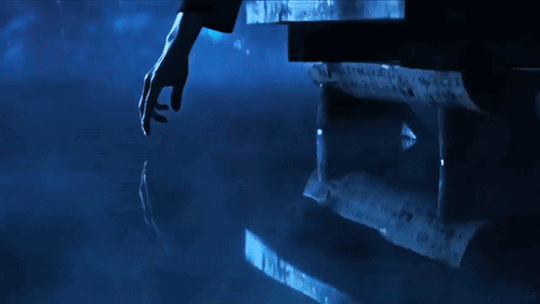
GIF: Originally posted by @tavners
Pairing: Morpheus/Dream of the Endless x AFAB reader
Summary: Reader Self-Insert. After restoring the Dreaming and locating the missing dreams and nightmares, Morpheus turns his attention to finding you, the human he believes fate has chosen for him. (Title inspired by Placebo's "This Picture".)
Warnings: Minors DNI. Dark!Morpheus. Soulmates. Angst. Obsessive and possessive behaviour. Tension. Home invasion. Voyeurism. Implied masturbation. Dream manipulation.
Word Count: 2.6k
A/N: Wow, this took way longer to finish than I had originally planned. My head's been all over the place with trying (and thus far failing) to find a new job. The themes are very different to what I've written before; I hope it reads okay. Please let me know what you think. All my love, Saskia xx
Sandman Masterlist
---------------------------------------------
Fate.
A phenomenon that governed every particle of matter within the known universe and even those beyond.
Some considered it a comforting concept that excused them from the burden of decision making, citing: "I'll leave it up to fate." For others the phrase was a cursory, throw-away comment or a romantic line they heard in the lyrics of a song.
The real truth of the matter was that Fate was a trio of immortal beings, goddesses, with sight so potent that they knew the past, present and future of every individual to have lived. The mythology of the Greeks, Romans and Norse hadn't been too far off with their stories of the Moirai, Parcae and Norns but of course, no humans really believed there to be any realism in myths. They were just stories. It didn't matter either way; they existed and had influence regardless of what the majority believed.
For beings such as The Endless siblings, the presence of Fate in the cosmos was not only real, but also something that affected even themselves.
For the King of Dreams, an eventuality had been prophesised long ago by The Kindly Ones that spoke of a bond that was to be forged between himself and a mortal.
Lord Morpheus, in his pride, had tried to be above such a foretelling, even questioning its validity because the notion of a mortal accepting his version of the universe seemed wholly implausible.
But he could not truly stop himself from wondering about you, reaching out to see if he could feel your presence in the minds of the dreamers he hosted.
It wasn't something he indulged in with frequency. More of a once-in a-decade interval. Enough to appease his curiosity.
Of course, this was put on hold during his imprisonment at Fawney Rig.
Morpheus had had much to contemplate during this period. The damage his absence caused to the collective subconscious, the decay of his realm, the loss of freedom and dignity. There was also a chance that you had been born and died in the 106 years he spent in captivity.
What if he was too late and had lost the chance of discovering who you were?
It was a nauseating prospect that scraped and scratched a space deep within his being; bleeding him of his remaining stores of hope that were so significantly depleted after the death of beloved Jessamy.
Despite the nasty emotional wound, finding you was a charge that he assigned at the end of his priorities after his escape.
Recovering his scattered tools, restoring the Dreaming, locating his absent creations, unravelling the mystery of Rose Walker and confronting Desire all had needed to come first.
The latter interaction had left Morpheus with a seething rage that was currently propelling him down the boards of the dock that sit above the Ocean of Dreams.
The dense mist in the air is buffeted by his movements and the only sounds are the tread of boots, the creak of wooden slats and the lap of water.
With each step, the liquid becomes choppier as it reacts to its master's mood and by the time he has reached the end of the dock, the surface of the water roils fervorously, completely in line with Morpheus' dangerous temperament.
The words of Desire's final silken-toned taunt echo in his mind with grating persistence.
"Oh, poor Dream. I really got under your skin this time, didn't I?"
He is loathe to admit there is truth in the question.
There are moments where Morpheus ponders the turn that the relationship between them has taken. How Desire went from being his favourite sibling to someone one shade shy of an adversary. Their faultless adeptness at provoking his temper and manipulating the events that encircle him would be impressive if not for the danger posed to humanity.
The agitated water eventually draws focus to how out of control he and his emotions have become. Morpheus knows he must get them in check, and quickly, for he knows the consequences all too well should he ignore it.
He clenches his fist and swallows it all down, pushing it deep inside his belly until the crackling entropy of the anger is fully dispelled.
Morpheus then sweeps his coat out behind him as he sinks lithely into a crouch. Trepidation nips at his heart and tugs his attention to a sobering thought.
This foray into the water may be fruitless.
You may be long gone and there would be no way of ever knowing you.
His nostrils flare as he takes a deep breath; he has run out of excuses to not look, even if he is afraid of the outcome.
Long, delicate fingers dapple the surface of the inky ocean. The waves still at the touch, obedient to him with instancy.
He repositions to full height and reaches into his coat to find the pouch of sand stashed in the pocket. A handful of twinkling grains slip off his palm into the ocean, lighting the water it touches to a luminous green.
"Find my soulmate," Morpheus commands silently.
The intention is set. He steps off the dock into the water.
At first, like every other prior attempt, there is no sign of you. Morpheus floats submerged in the tepid liquid, filtering through the hubbub of countless other dreams and nightmares.
Then there is a pull.
It is faint yet indisputable. Warmth explodes in his chest and he groans inwardly from the delicious sensation of relief.
You are alive, and you are dreaming.
A path of radiance appears in the water, a line that shows your connection, and provides a location for him to hone in on.
Morpheus dives deeper without hesitation.
As he reaches the edge of your subconscious, he rejoices that he got a handle on his emotions. He wouldn't want your first perception of him to be one tinged with rage, however unaware you were of him, with your soulmate being the source.
He hesitates for a moment before entering the dream you are in and is somewhat taken aback by what he finds.
A room comprising of four blank walls, a floor, a ceiling and a door. There is but one other feature; a window, and its view is as non-descript and inoffensive as the internal space.
You stand by said window, head turned from him.
Despite being unable to see your face, he sees your anxiety with immediacy. It is an aura hovering about your body, being sucked into your lungs with every fast-paced breath.
You begin to throw glances towards the door. Morpheus filters through the layers of the dream. No one is scheduled to come across the threshold.
The more he observes, the more questions arise in Morpheus' mind.
What was making you so affected? What were you expecting to happen?
There's nothing in the scene that is intended to be unpleasant yet you are reacting in a way that most observers would characterise as unsettled.
Morpheus, despite not yet knowing you, doesn't like to see you this way. His dominant instinct is to end the dream but he quashes the desire to review the bigger picture.
The empty room dream was symbolic of a beginning.
It clicks into place.
What you were feeling, even if on a purely instinctual level, was the anticipation of meeting your soulmate and starting your new life.
Morpheus steps into the frame, just a couple of paces behind you.
You feel his presence instantly, eyes full to the brim with tears as you whirl around with a soft gasp.
You see him.
The tears spill and patter onto the white floor.
Morpheus reaches out, overcome by his need to provide comfort.
You disappear.
-------------------------------------
Morpheus is sat on his throne. He pores over the book he had located in the Dreaming's library a little over a week ago that contains the details of your life. It is something he has taken to doing when the impatience of waiting for you to fall asleep becomes too keen.
Your subconscious has him enraptured, watching it every night as if it is a stage show. Each dream he delves into is like the tug of fingers on a loose thread, your psyche has begun to unravel before him.
Everything from whims to cravings, hopes to fears. Your temperament, the things that delight and irk you. What drives you and demotivates you. He consumes it all with an insatiable hunger.
Based on the projection of yourself that he sees, there is no doubt that he is attracted to you.
All that prior haughty disregard for the Fates' prophecy has been cast aside like a negative thought in a meditation session. Morpheus is a romantic. A believer. He is ashamed to have even doubted your coming.
He wonders if it would vex Desire to learn of him finding his soulmate and by extension, the prospect of companionship, perhaps even physical intimacy or love.
It is all too easy to imagine the sickly sweet grin they would smile at him, shown to be fake by the almost imperceptible contempt glinting in their golden eyes.
Would his triumph drive them to distraction?
It is this smug sentiment that spurs his next decision. He wants more. The next logical step is to find you in the waking world.
He rises from his throne, a sure hand ready to bring forth his pouch of sand when he falters.
Tears pool in his eyes.
His mind is suddenly marred with the memories of what happened in 1916. The agony, mortification and rage that followed. He couldn't go through that kind of treatment ever again and the waking world expanded the risk of it transpiring.
"No," he says resolutely. His sadness turns to resolve, the hard line of his grimace matching those set in his brows.
He will not let the actions of a group of mortals dissuade him from going to you. And besides, he has researched everything he can about you from within the safety of the Dreaming.
He takes a measure of sand and uses it to materialise within your bedroom.
It is obvious from a quick scan of it that deliberate attempts have been made to ensure the space is cosy and calming.
Two marshmallowy pillows support your head. The cotton sheets have been meticulously tucked to avoid drafts. A lavender reed diffuser fragrances the air with a subtle scent. There are no devices or screens visible.
Everything has its place. A coaster supported glass of water within reaching distance. Touch activated lamp in case of emergency. The diary lined up with the back left corner of the bedside table, pen placed parallel in the spine dent. All clothes are in the wardrobe or stashed in the laundry basket.
Morpheus moves to the curtain-shrouded window and delicately moves the dark, heavy fabric to catch a glimpse of the outside world.
The scene is sepia stained from an old streetlight positioned right outside your home. It explained the choice of curtains.
You stir slightly from the change in environment and Morpheus allows the curtain to fall back in place. He remains stationary until your breathing returns to its previous pace. It is imperative that his presence remains undisclosed. He knows that mortals do not take well to home invasion.
Then, your right hand slips out from the duvet cocoon revealing a cushion cut ruby ring on your middle finger.
He smiles exultantly. The similarity between the jewel and his own now-destroyed dreamstone was undeniable.
The Fates were making it transparent.
You were the one.
Morpheus approaches the side of your bed now. In your momentary discomfort, you had moved your head, making your whole face visible to your uninvited guest.
He bends gracefully so his face is closer to yours and observes you with an intent fascination.
Even in the gloom, Morpheus asserts that your features are even more captivating now that he is able to look upon them in person and is certain that if he could guarantee an absence of fear then he would fall to knees and worship you right there.
Fingers stroke a lock of hair splayed across the pillow and his thoughts turn darker still, imagining what he would do with you if he could get you alone in the Dreaming. How he would seduce you with words, and then pleasure your body with his own until you were senseless.
Getting you there would be so easy, all he needed to do was move his hand up and touch your skin and -
Morpheus stops himself, deciding that now is not the time for an introduction. He will wait until tomorrow. You need to rest. It will be quite the revelation for your sweet mortal heart.
Morpheus whispers a promise, "We will be together soon, my precious soulmate."
He leaves after taking one last look at your peaceful form.
When he returns to the Dreaming, Morpheus discovers that the visit has riled him way beyond what he thought possible.
It was supposed to sate his curiosity and answer some questions.
It has done the opposite.
His craving for you is sublimely intense, opiate-like in its ensnarement.
He needs to possess you. To have you all to himself. Everything would fall into place. Loneliness, disillusionment, jealousy; they would never darken his outlook again. You would heal him, he is certain of it.
He paces restlessly in the low light of his private chambers as heat ripples beneath the surface of his being, charging him with pure sexual lust.
He hungers for the moment when you feel the same about him.
For now, all he can do is stand and touch himself while thinking of your face, an act that has been carried out repeatedly in the days since he found you in the Ocean of Dreams.
An erotic idea enters his mind.
Your subconscious is still in the Dreaming; he knows the feeling of it intimately.
Perhaps he could bring you a dream mirroring his own current fantasy.
To give you a taste of what was to come.
A gift that only he could bestow.
The mere thought of it turns him on even more. His back arches and his eyes roll back as he choses the words through which he would deliver the offering.
"Dream of me," Morpheus murmurs breathlessly. "Dream of me."
He repeats the phrase until he is unable to continue, moans taking over the darkened space around him.
-------------------------------------
It is dusk the next day when Morpheus returns to the waking world.
The instant he touches down on the Earth's surface, he knows exactly where to go. The metaphysical connection between you is as strong as the energy pulsing through a ley line.
The city he is directed to is thrumming with life but the side street he stands in has been spared from the furore.
It is fortuitous that he is permitted to be unobserved for Morpheus is struggling now with the urge to get closer.
Providence is pulling him in and also locking him out.
He walks up to the door and then an invisible force makes him back away.
He doesn't even try to fight it.
The Fates hold all the cards. Morpheus is beholden to their each and every whim.
It is surprisingly liberating.
He is dancing in the cross hairs. Blinkered by the tie the universe has fashioned for you.
All he has to do is wait.
The door to the building is pushed open.
-------------------------------------
Taglist: @herfantasyworldd
"Fate. Up against your will. Through the thick and thin. He will wait until you give yourself to him."
#the sandman#the sandman netflix#the sandman 2022#sandman#the sandman fic#sandman fanfic#the sandman imagine#morpheus#lord morpheus#morpheus x reader#morpheus/dream#morpheus/dream x reader#dream of the endless#dream of the endless x reader#dream#dream x reader#the endless#the dreaming#fanfic#fanfiction#tom sturridge#dark!morpheus#saskia writes sandman#Spotify#angst#soulmates
766 notes
·
View notes
Note
i've got no idea if you are writing right now but i would love myself a fem!reader x kageyama. love you xx
U KNOW WHAT NONNIE i would love myself a kageyama x reader too hehe so here u go!!
p.s. i was half asleep when i wrote this literally i was fighting to keep my eyes open so its not my best pls forgive me i tried

you remember the conversation you had with tobio so, so clearly, almost as if it was yesterday. which, you think, isn't entirely untrue considering it occurred barely two weeks ago.
tobio had outright rejected the idea of keeping your relationship a secret.
"why would i want to hide the fact that you're my girlfriend?"
and you try not to melt into a puddle over his bluntness, the way the words my girlfriend rolled off his tongue with ease. he didn't stutter. didn't trip over his words. you were his.
you cite a few reasons why he would consider it, all of which are valid in your eyes. backlash from fans. reduced sponsorships. less guest appearances on evening talk shows. factors that were valuable to his career. but he had told you, with an almost terrifying conviction, that he doesn't care. so long as he still gets to be on the court, the less-athlete and more-celebrity side of his career doesn't matter to him.
so you two agreed on a compromise. you would ease your relationship to the world, slowly letting more and more people know until it's out in the public.
and the first ones to know are the ones closest to you both. your family and his sister. your friends and his old teammates from highschool.
shoyo had been the first person he called when you agreed to be his girlfriend on one of your at-home dates. you can recall peering into your apartment's living room after a quick trip to the bathroom, watching tobio with his back hunched near the corner.
"she said yes." he whispered into his phone, and you could hear shoyo's overexcited screaming even though he's not on speaker.
next, was your boss. though workplace relationships aren't explicitly stated in your contract to be forbidden, it's highly still discouraged. in turn, you two had gotten an almost hour long lecture about policies and rules. about what this could mean for not only your careers, but for everyone else on the team as well. about the public's possible response.
and with a practiced, corporate smile, you reassured your boss that you have it all under control.
the last people in your four-part plan to find out would've been tobio's teammates and coach, before you (when you're both ready) make an announcement on all of schweiden adlers' social media accounts.
it was so easy, and tobio had agreed to follow through with it. you remember because he swore with a kiss on the edge of your lips and a shy smile that he would.
which is why you're equally dumbfounded and shocked when he announced your relationship to the public. during a post-match press conference. on live, national television.
satisfaction began to settle in halfway through the presscon. the team was doing great. they answered every question with ease, behaved as well as they could. there were moments of playful banter between the members that the fans would go crazy over. every reporter followed through the brief you gave them earlier about which questions they could and couldn't ask (heavily emphasizing no questions about kourai's height).
it was going so well.
until one of the reporters asked one particular question. it was done in good faith, you could tell by the small grin on her face and the quiet chuckles from everyone. she was playing off an inside joke from the adlers' fanbase which, to your confusion, seemed to adore you just as much as the members of the team.
"is your manager single?"
hirugami laughs, toying a bit with the microphone in his hand before he opens his mouth to answer the question in the same lighthearted nature.
except, tobio beats him to it.
"she's not."
the room falls silent. everyone, even his teammates, look at tobio with intrigue.
"r- really, kageyama-san?" she's damn near shaking, the poor lady, when she realizes tobio's eyes are on her. all bright and blue and intense.
he decides to spare her when he takes a moment to look at you, standing near the side of the stage. you're glaring daggers at him, trying to convey with your two eyes multiple warning signs in big, bold, and red letters.
please don't.
and tobio, who has grown to be perceptive when it comes to you, knows exactly what you mean. he just doesn't have it in him to care right now.
"i should know. i'm her boyfriend."
your mouth falls wide open. the only thought that runs through your mind is you two are so fucking screwed. this wasn't part of the plan you meticulously arranged and presented to your boss.
you don't know how long the silence lasts until kourai decides to break it.
"i knew it!" he says, slamming the velvet cloth covering the long panel table. the sound brings you out of your daze. "i knew something was going on between you two."
you think there's no possible way this situation can get worse, but wakatoshi nods in agreement, which brings about an onslaught of hungry reporters asking questions left and right. you take this as your cue to rush in and call off the presscon.
"is it true?"
"how long have you two been dating?"
"did kageyama-san really ask you out?"
you drown them out to the best of your abilities, ignoring the less than kind and backhanded questions directed towards you. tobio looks into your eyes as he passes by you in the line of players you're ushering off the stage, but you quickly avert your gaze.
"we'll talk later." you mouth.
after gathering their belongings from the locker room, the team piles onto the bus to head back to their home court. tobio settles into one of the seats near the back, saving the window seat for you.
he waits, watches in anticipation as you step inside the bus. you catch his pleading eyes right as you're about to take a seat in an empty row on the front.
you try to resist. really, you do. but you've never been the best at denying tobio. for more times than you care to admit had you been the subject of teasing by the team for entertaining each and every request that tobio makes.
so you sigh, before making the long walk to the back of the bus.
tobio allows you to scoot inside after helping you with shoving your backpack inside the overhead compartment. the bus springs to life right as you take your seat, engines silently roaring as it begins the trip back home.
a moment of silence passes before tobio takes your hand in his.
"i'm sorry." he says, dragging his thumb over the lines on your palm with each syllable.
"are you really?"
tobio pauses, almost contemplating. "you'd feel better if i didn't answer that."
a quiet laugh falls off your lips. of course you already knew the answer to that. tobio has always been unapologetically open about what he wants.
screw his old teammates for going with all his demands.
tobio's ministrations on your hand doesn't stop. in fact, it grows more frantic by the second. lazy movements turn into his thumb rushing back and forth against your skin. it means he wants to ask you something, and he's hoping this will silently convey his question.
"i'm not mad." in an instant, his worries are quelled. you move closer to lean your head on his shoulder. he plants his head on top of yours.
your limbs melt into each other until you're not sure where you end and tobio begins.
"but you didn't have to say that, you know. hirugami was handling it." you give him a light nudge.
"they were asking if you were single," tobio scoffs, turning his head so he can nuzzle his face against your hair. he breathes you in. your scent overtakes his senses until the only thing he knows is you. that you are his. "i think i have the right to answer that."
"god your publicist must hate you." you roll your eyes. "our boss must hate us right now too."
"don't care." he pries himself off the crown of your head, leaning down to latch his lips on your jaw.
tobio leaves one kiss, right at the very edge. you tip your head to the side so he can leave another on the flesh of your neck. he's about to plant a kiss just above your collarbone when wakatoshi chimes in from the seat in front of you.
"it's not very appropriate to make out on the bus."
you jump away from each other, cheeks flushing red now that the entire team's attention is on you. but you can't find it in you to care enough to tell them off. the hollering and the teasing matters less than the fact that you have tobio, right by your side.

dividers by @cafekitsune
#kageyama tobio#haikyuu#kageyama tobio x reader#haikyuu x reader#kageyama tobio fluff#haikyuu fluff#hq x reader
215 notes
·
View notes
Text
actually, separating this out from my long-ass post about Ruidusborn As Oppressed Group being an impossibly broken metaphor: I think a huge problem here is that Imogen is, genuinely, a valid if imperfect metaphor for disability on an individual level, but not on a systemic level, and that failure to distinguish the individual from the systemic is a massive problem in a ton of political discourse today. (I also think it underscores a disability-specific issue, that of disability genuinely being a problem for many people with or without the presence of ableism on top of it, which is not true of, say, race, which ceases to be a problem in any capacity in the absence of racism.) In other words: Imogen's experience can be extremely relatable on a personal level both in terms of living with disability/chronic illness, and for a personal experience of discrimination; however, while it stands as a metaphor for experiencing the drawbacks of disability/chronic illness (symptoms, energy levels, decisions one must make, etc) it fails as a metaphor for systems of oppression: it is purely individual.
Imogen's powers are indeed a burden, especially early on! She struggles with them and they cause very specific problems for her on a physical and emotional level. They disrupt her sleep and cause her to make different choices than she would if a potential flare-up (pun genuinely not intended here) were not an ever-present risk. She does not know their source and is frustrated by this. This is completely in line with a metaphor for chronic illness on an individual level, ie, Imogen's experience would be immediately recognizable to someone with a chronic illness, especially someone who had to fight to find a source or get a diagnosis. However, the effects her powers have on other people means that treating her with caution or distancing themselves from a mindreader is not unjustified; which makes it an extremely bad metaphor for discrimination, and in turn for any form of oppression for something that is not a problem in the absence of discrimination, such as sexuality (and I've talked about this extensively before). Again: her experience of isolation may still be relatable to someone who has experienced that for race or sexuality in real life; but only as an individual experience. It does not properly scale in-world to a systemic one.
And, for what it's worth, I think this is the fundamental issue with Bells Hells and their interpretations (and many fandom interpretations of a number of events in C3, and, as mentioned, irl political discourse): the inability to accurate distinguish individual experience from systemic issues (and more generally, the actual root cause). It's what ultimately leads to a story in which Bells Hells make their choices (or don't, as the case may be) on the basis of a falsely assumed universality of highly specific niche experiences. This does not mean, again, that their pain is not valid; but they ascribe it to something that is not in fact responsible. They take a single point and extrapolate not just a line, but an entire plane. And, as in reality, this means the root cause ultimately goes unaddressed while people point fingers.
#cr discourse#long post#this actually is like. the heart of it all. i mean we can talk about pulled punches and dm signaling as well#but ultimately it's people who cannot distinguish Specifics from Patterns both in-game and out. it's a relevance/root cause problem#and an empathy problem
75 notes
·
View notes
Note
Hello! I just wanted to say I stumbled across one of your posts and ended up looking through the trans tag in your blog for a while and idk it felt so so nice to see a middle aged trans guy just living life and being there for others who are at earlier points of their own trans related journeys, and I hope I can look as awesome as you and be as comfortable in my own skin and style and everything when I'm older.
I guess I also wanted to ask if you had any insight or advice about a couple things, if you're willing to share.. First thing is, did you ever struggle with passing but looking much younger than your age and that somewhat affecting your perception of yourself? I'm 28 and I started T 11 months ago (though at a pretty low dose because I wanted slow changes) and my face just recently started visibly shifting to a more masculine contour and I love it, but I still don't really look like a 28 year old guy.
I've always passed easily even before T but people think I'm like 18-21 max. Things were fine while I was in college (I came out at 19 so for a while my face just felt fitting enough and didn't make me feel either dysphoric or in a weird age limbo) but every year it feels more frustrating and makes me feel sort of alienated from myself including in mental ways, like I'm just a little kid who can't grow up. Like I'll never look like a "real guy" even though I can be stealth because I look like a weird teen and not like a grown up man. It's especially bad when I look at my amab younger siblings who are now also adults and see how I "should have looked" in some other life if I was cis. I guess maybe that's just another manifestation of dysphoria that I didn't have to deal with before? Did you ever experience something like that? And if yes did it get better after some years on T or how did you deal with it?
The other thing is just.. internalized transphobia. It's one thing to know things in a logical or intellectual sense but it's so hard to really feel and believe it sometimes and let go of all the awful transphobic stuff my family said to me during the first years of me being out. I just kept going anyway because I needed to be true to myself and my family basically bullying me wasn't gonna just magically change how I felt about my gender, but what it did do is put my already low confidence and self esteem (in this context regarding my gender) down on the floor. And sometimes I still just think and worry "what if they were right and I was wrong and I'll never be real and valid because of x y z", "what if I'm just delusional", "what if I'm a ridiculous freak". I know, in a way, that no I'm not. I'm just a trans person and they're just transphobes. But feelings like that just get to me sometimes and I don't really know what to do about them even nearly 10 years after coming out. Does that get better at some point? Just like you kinda stop giving a shit what people think about you in general as you get older? But how can you change those internalized views affecting what you think of yourself?
Bit nervous about asking this stuff tbh, so sorry it was so long also sorry if I worded any of it in a not so great way.
I will say though, that seeing older trans people like you does help a little bit. Just makes it feel like "hell yeah I wanna be like him when I grow up". So thank you for showing me that today ;u; (and also for inspiring me to put a little more thought and effort into my styling and fashion choices haha)
Heya, Anon! Let's see what I can cover here:
Looking young.
Oh my god, yes. I was getting carded to buy superglue and spray paint well into my late 30s (I started T at 33). When my partner first asked me out for a date, they were worried I wasn't old enough to drink yet (I was 36).
This is me 1 year on T, age 34.
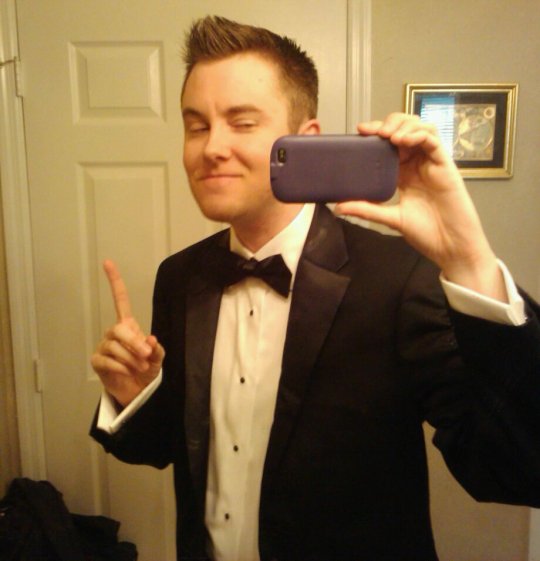
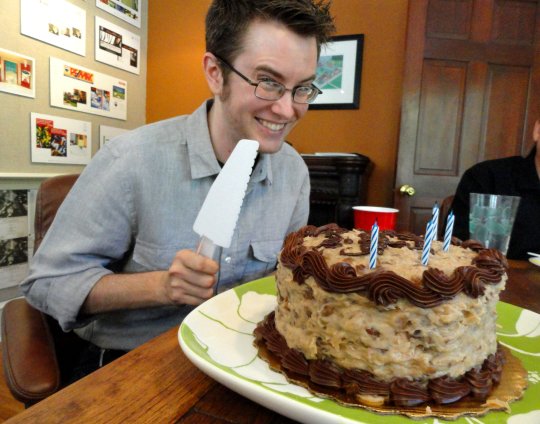
Years 6 & 7 (ages 39 and 40), is when I feel I started looking older.
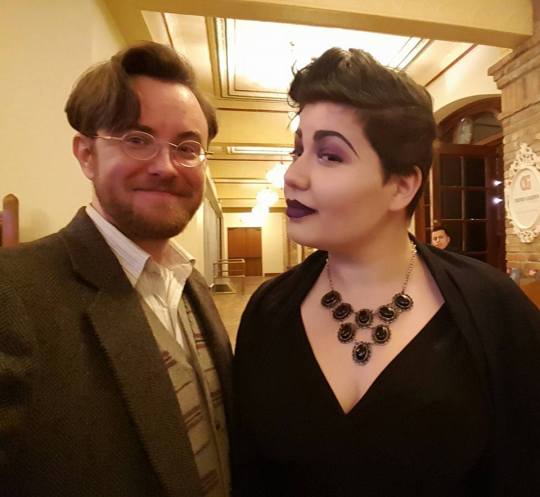
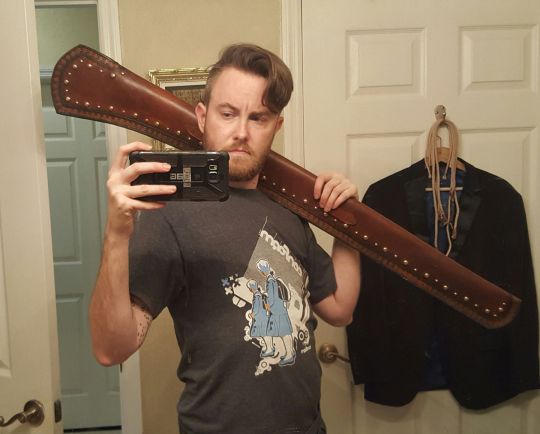
I feel like it's only been recently, 14 years in at 47, that I look in my 40s, and a "mature" adult. My beard finally getting full helped, as did my receding hairline. And I feel like my skin texture has toughened up enough, to where wrinkles show more.
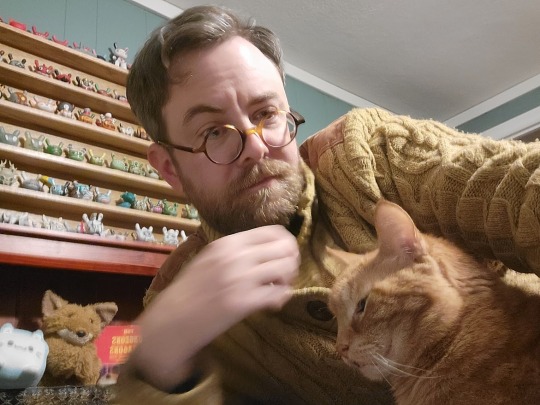
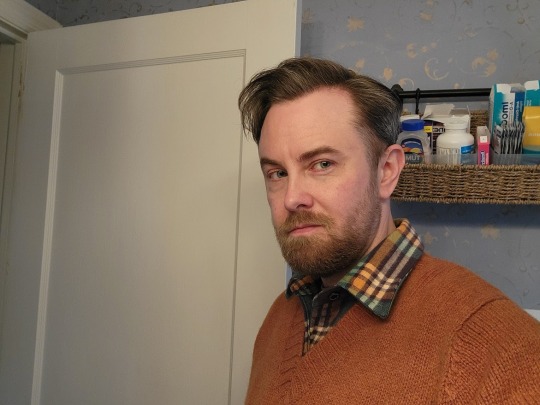
That said, yes, it is tough and annoying to deal with. Even when people tell me I look like a particular cis man (where I actually see the resemblance, lol), when I look at us side-by-side, I feel like I'm just a pale shadow of him. I feel jealous and dysphoric, even while I'm flattered by the comparison. I wonder what I "should" look like, and it feels like something has been stolen from me. Its a roller coaster of emotions.
That feeling never really goes away, but you need to afford yourself some grace. You're going to be your own worst critic, and I guarantee you that, of many cis men you grew up with, you can probably still see the kid in them. So of course, you're going to see the kid in yourself.
But, you also just need to let time run its course. HRT is a marathon, and a lot of changes don't really settle for about 5 or 6 years.
I hate to say "enjoy it while you can" because I sure as hell bristled at being mistaken for a teenager or barely 20 when I was in my 30s. But do enjoy what you can of it. Because once you hit middle age, you're going to start dealing with a strange intersection of dysphoria and aging that I myself am still trying to navigate.
One other way I help myself get over negative feelings is to think of how differently my life would have been if I were cis. I honestly worry I would have been a worse person; even though being trans creates a lot of obstacles in my life, I feel like it's been a net gain: being able to know myself so well and help others learn about themselves.
Internalized transphobia
This got better for me with age. My epiphany was that, even over a decade into my transition, I was still softening myself for the benefit of friends and family. I was still using my gender-neutral birthname (I only recently changed it). I would call myself a "person", "guy", or "dude", instead of a "man". I dressed on the young and casual side, eschewing full-on masculine outfits like proper suits with ties.
I only recently pulled myself out of this. It still is a habit-in-progress to refer to myself as a man, even though I have always felt like one. And I've started to dress more vintage, not just because of hyper fixations, but because it's a way to lean into a presentation that is unequivocally, "this is a middle-aged man". And it's done a lot of good for my mental health.
What I'd suggest is to see if you are holding yourself back in any way wrt your gender presentation or how you talk/think about yourself. Give yourself full permission to acknowledge that you are a man, full stop. You're a young man, sure. But still a man, and a full-ass adult at that.
I hope some of this helps. Transition gives us a unique toolset for examining who we are and how we want to move through the world, and that work certainly doesn't end after finally getting on HRT. <3
160 notes
·
View notes
Text
Why I don't really like the 12th house. / observations
How I perceive the 12th house, my real life observations on it and why I don’t really like it

TW : mention of anx!ety, d€pressi0n, self-und0ing attempt, mental he@lth issu€s, pan!c att@cks
(Sorry in advance for the constant cens0r!ng, I don't want to run the risk of getting shadowbanned like it almost happened before)
In december and january of 2023/2024 I was having 12th house transits (Mars then Venus). This is what I wrote on my notes app about the negative experience I had :
I am currently having 12th house transits at the time (Mars then Venus) and I've been so much sleepier and prone to irrational, unexplainable stress. Like I wake up and I am still tired bruhh I hate it as a Mars Dom I usually instantly and really easily wake up in the morning so it's frustrating because I feel less productive and sloppier and daydreamy but in a bad way.
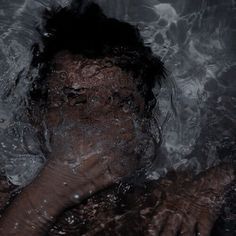
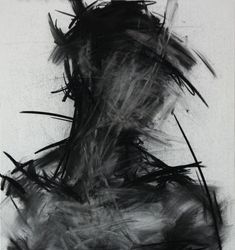
Why I don't really like the 12th house...
I genuinely don't understand the "hype" (if we can even use that word) around the 12th house. When I first got into astrology, I saw so many posts about it saying how magical it was, how special it is to have placements in this house, how it means that you have a higher purpose than others, how you are so sensitive, an empath...And I have to say, yes, of course, some of it is true. However, it is clearly a more romantisized description of the 12th house. This idea of a romantisized version of the house was then overtime validated by the fact that every single person that I've met with 12th house placements/stelliums were far from living this almost fantasy like description. In fact, these positive traits seem to be rarely easily expressed for people who haven't studied astrolgy to get to know themselves better and understand their purpose. The people that I know with these placements were mostly d€pressed, too nice, had anx!ety attacks, insomn!as , and sleepless nights. It is honestly such a lonely house. Having these placements in the capitalistic utilitarist world we live in is sadly more of a curse than a blessing...
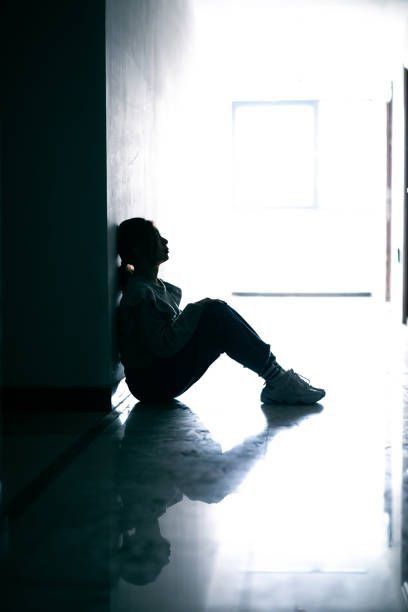
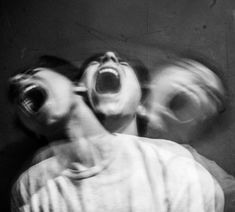
People I know with 12th house stelliums/ placements
• One of my friends has a 12th house stellium, her Sun in Taurus, Moon in Gemini and Mercury in Aries being there (the sign of the house is aries). She also has an Aries North node in the 12th house.
She always felt overstimulated and often told me that sometimes she didn't know if what she was thinking was really her own thoughts or other people's. She also had this obsession, or more so obsessive fear, with the idea of having to/ being forced to "sacrif!ce herself" for other people, for a job, for school,.. We often discussed this fear of hers and she would tell me this "why do people think we necesseraly have to suffer in life ? Why is struggle and suffering so normalised ? I don't want to sacrifice myself to achieve something, i don't want to purposefully inflect myself pain to live ? This is so weird to think that suffering is inevitable if you want to survive or live. That it's a normal part of life and that we should all be agreeing with it"
She is really empathetic and sweet but sometimes becomes all of a sudden defensive and passive-aggressive. She is also often anx!ous and as a result doesn't eat or sleep correctly.
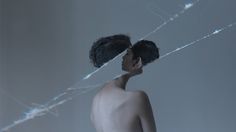
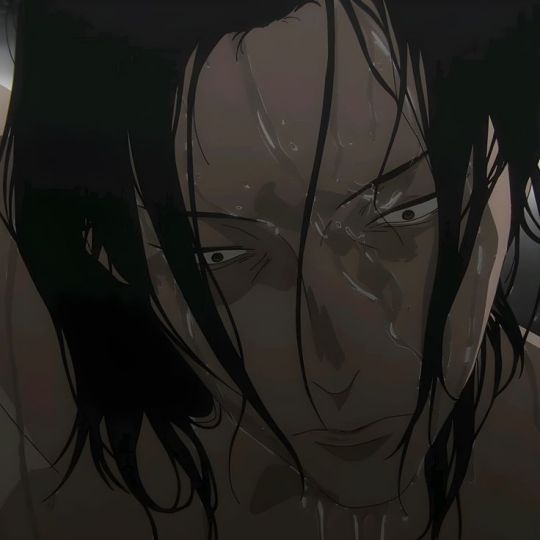
Another one of my high school friends, less close, has a 12th house stellium in Aries (Sun, Moon, Mercury and Venus). He also has a North node in Aries in the 12th house.
Because I am/was not really as close with him as i am with the previous friend, i can moslty only share my impressions and assumptions from the interactions i had with him. I think it's interesting to say that his energy really stood out to me. He had sleepy eyes and a melancolic aura that reminded me of 19th century poets. If you know about Arthur Rimbaud, there's this one picture where he seems to look away. He basically looked like he was permanently captured by an old antique camera. His energy felt like what sepia looks like if that makes sense. He also had green or blue eyes (i don't exactly remember) that emphasazied the impression that he was mourning for something permanently. They were wondering, pensive almost sorrowful.
He was really gentle with people. His friends often said he was like a teddy bear, despite being almost 2meters tall. It's interesting to point out too that he was a gym bro. I think he would go to the gym probably 6 times a week sometimes, yet was so nice and calm. He wasn't acting like a cringy alpha male, which is pretty surprising for a cis heterosexual gym bro man with an Aries Sun, stellium and North node.
I think part of it is the 12th house influence that toned down this energy a bit, and instead of being selfish like a regualr aries, he was more selfless. He was always respectful towards women and never shamed people. However, he had a lot of insecurities and felt kind of helpless regarding fixing certain problems in his life. He was sometimes a bit too passive, and wasn't too comfortable when met with conflicting energies or situations that required decisive reactions.

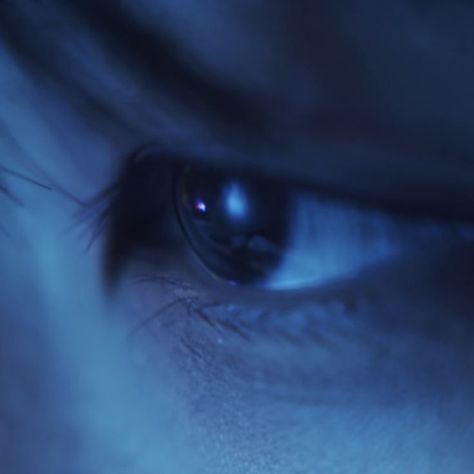
My sister has Lilith in the 12th house and her subconscious thought processes can become easily extremely s€lf destructive. She was diagnosed with severe depr€ssion and had to go to the mental h0spital once after doing a self-vndo!ng attempt. When her symptoms were still intense and she was still struggling a lot, she had to go to see a psychiatr!st and a therap!st on a weekly basis. It was a scary and crazy time. Until this day, she still has terrible sleeping patterns, many ins0mn!as, and often has pan!c att@cks. I distinctively remember one time it was so intense I thought she really was going to pass aw@y. She also used to have (and still a little) a huge victim complex, where she felt like she was condamned and doomed to live a miserable life, and that she is deeply misunderstood.


What drove me to come on here is a new student that I have met in college this year. We instantly clicked then she told me she was an Aquarius with an Aquarius rising and a Sagittarius moon. 3 of her personal planets fall in the 12th house, which means that, just like the two friends I have mentioned, she has a stellium. She then went on to explain to me how she was diagnosed with an anx!ety dis0rd€r. She said that she used to have, at some point, three pretty intense panic attacks on a daily basis. She told me that when she saw a therap!st for an appointment, the th€rap!st was shocked and said that it was probably one of the worst cases she has ever dealt with (update 21/10/24 : she actually didn't say that it was one of the worst cases of her career, she was just genuinely shocked at how my friend was able to survive living like this for such a long time).
This made me realize that there is definitely a theme with the 12th house surrounding chaotic sleeping patterns, restlessness, overthinking, numbness, emptiness, hightened anx!ety, melancolic tendancies, s€lf-sacrif¡ce and depr€ssi0n.


All of that to say that this house is somehow terrifying to me. I get the fascination for it. I just find it too eerie in a way. My chart, despite being a Sagittarius rising, is filled with fixed and cardinal signs. Pluto is prominent in my chart as it is thigtly conjunct my ascendant, so I don't behave and move through life like a stereotypical Sagittarius rising. On top of that, I have an 8th house stellium in Leo... I need to have control over things and situations, my ego is strong (i am working on it lol) and it is hard for me to surrender.
Therefore, the hyper mutable energy of the 12th house, its uncertainty and blurriness, gives me "anx!ety" and unsettles me. I never know what a 12th houser really thinks and neither do they themselves in a way. My fixed *ss finds that so stress inducing. I like when things are made direct and clear, but nothing about this house is direct nor clear.

#astro notes#astro observations#astrology#astro community#pick a card#pick a card reading#pick a picture#pick a pile
199 notes
·
View notes
Text
I wanted to share my experience with my beit din and mikvah. I believe that soon-to-be converts deserve to be prepared for what their experience could be like, and I hope this might help ease the inevitable mikvah anxiety you'll start getting
So, for reference, I converted conservative and with a recognized, reputable program that is unnamed for privacy reasons. I got all of my required education for all of this, along with a sponsoring rabbi with whom I have a very close relationship with.
I'll put a read more, but this is divided into four bigq blocks: preparation, the morning of, the beit din, and the mikvah.
I also want to clarify that this post is not an invitation to question the validity or "realness" of someone's jewishness. I share my experience to prepare other people, not affirm or prove my jewishness.
Preparation Work
I had my hebrew name picked essentially three weeks before my beit din, so I just submitted my chosen name and I didn't worry about that at all on the day of my B"D. I also had a questionnaire to fill out asking practical questions about my jewish journey. This questionnaire was filled with a lot of personal details, and it asked about how I observe holidays, engage in my community, and make shabbos holy. I was asked there for my name, and I wrote an entire essay about how I was led to judaism. There were no trick questions, and because I am a very active participant in my community, I was able to give a ton of details and examples about how I am living a jewish life. All of the rabbis on my beit din received an exact copy of this questionnaire, so they were able to read about me from my own words weeks in advance.
The morning of
The morning of my beit din, I took a very thorough shower. You are not permitted to wear lotions or perfumes, so I only shampooed and lathered soap on my body. If you have wavy or curly hair, it is hell on earth. I think I have wavier hair than I thought I did - my hair was so unpleasant and frizzy, and I've never had these issues. Just be aware that this might be a thing for you - it's okay to feel uncomfortable.
I decided to fast after this for spiritual and practical reasons, and if that's your thing and you're safe to do so, I recommend it. I took a lot of meaning out of doing this, especially because I had to drive a hundred-odd miles to get to my mikvah.
The Beit Din
The beit din itself was pretty short, and it definitely wasn't a test of knowledge for me. The rabbis on my beit din were familiar with a ton of my story and the practical ways I have become a jew, so many of the things they asked about were practical. I was given a ton of floor time to spend speaking about my thoughts, so they definitely got a good idea of what kind of person I am.
They asked primarily about how and why I came to judaism, my relationship with g-d, how I engage with the jewish people, and about any holidays I have struggled with.
My primary advice here, therefore, is to engage thoughtfully and fully with your jewish community. Having a history of that was essential for me - and one of the parting things the rabbis agreed with was just how integrated I am with my community, and how it can be a struggle to get other people to do that when they want to convert. Community, community, community, here.
After this, I recognized and affirmed my commitment to the jewish people (I'm pretty sure this is called kabbalat ol ha’mitzvot) by reading each of the thirteen commitments I am making by becoming jewish. Obviously, I agreed with all of them, I just had to verbally recognize my commitment. Judaism is a people who make sure you truly understand and consent to anything you do. It might seem like a whole lot of repetition, but that's the point.
The Mikvah
So my mikvah was at a facility - you don't have to have a mikvah like mine. There are a few options for you, so this definitely differs between convert.
I had a preparation room to myself - and it had everything. I undressed, removed all my non-permanent body jewelry, and then put on my robe.
Now, if you're also trans, you'll definitely have to talk about your options, but I had a ton of luck. The mikvah I went to had railing that I could drape my robe and towel over to preserve my modesty. I also have a male rabbi that I trust completely with my being trans. He was the only one who could directly witness the immersion with his eyes. The other rabbis listened behind a cracked door and affirmed that they could aurally hear my conversion. You might have something like that for you, but many, many rabbis will want to help preserve the convert's modesty and dignity. Trans or not, there is a lot of flexibility here
I did a couple practice dunks to get used to the mikvah waters. It's not as deep as I thought (I'm 170cm), so I kind of had to go in the fetal position. I also have a lot of nerves around full immersion, but it wasn't bad. The water was very warm, and it felt very inviting and clean.
My rabbi had me repeat the blessing for immersing, to which I then dunked. Once I rose up, I said shehecheyanu, dunked again, and I said Shema and dunked one more time. My rabbi left before me, and then I gathered up everything, wrapped in my robe, and left (yes, I wiped up all the water I dripped all over the floor, don't worry. That feels like a courtesy I encourage people to keep in mind).
I dressed in my room, and once I left, I was surrounded by everyone. I received my certificate of acceptance to am yisrael with my hebrew name I chose. After, I was blessed by all the rabbis and we sang.
One thing I encourage people to consider is writing a card for your rabbi or anyone else who helped you. I wrote a card for my rabbi and the executive director who was there for me the entire time to facilitate all of this, and it was very cathartic to get my thankfulness down permanently. But that's essentially all there is left to say - it was a very quick process, all things considered. And it was very inviting. Trust that you have the knowledge and passion to get through this. Rabbis typically schedule your B"D when they can tell you're ready. Being able to trust them and you helps this process go so much smoother 💛
#jumblr#jew by choice#jewish conversion#mikvah#personal thoughts tag#long post#i am willing to answer questions but this really is the long (just the long) of it#i will also include this in my post directory so it will be easier to find later#once i am on my PC i will be able to do it so it will definitely be included by tonight#bad timing for this post on my end but consider: oopsie :3c#also i'm sorry for the potential lack of proofreading since this is stream of consciousness. i am willing to clarify anything
77 notes
·
View notes
Note
What you all seem to be missing is that this isn't even a topic of infertility, it's of delivery. The discussion is NEVER "can Elain get pregnant" because the problem was not "could Feyre get pregnant." The plot introduced into the series was what happens after she became pregnant and carried the baby to term, could a non Illyrian safely deliver a baby with wings which has now carried over into the discussion of Elain since it's canon that Feyre and Nesta were changed while we were not told the same of Elain. It's not a reason Elain can't be with Az but it is a valid topic of discussion within this series since the author posed it as a plotline. In the real world, most women safely choose a Caesarean section if they're dealing with delivery issues in their pregnancy so acting like delivering a winged baby has real world implications is simply you jumping on a pedestal for something to yell about. That's not to say there aren't delivery issues in the real world but this scenario is not one of them.
TW: death, infertility, pregnancy and childbirth related trauma. Also a brief mention of sexual assault.
Hi anon,
Respectfully, please stop being deliberately obtuse. Let's break this down, line by line.
What you all seem to be missing is that this isn't even a topic of infertility, it's of delivery. The discussion is NEVER "can Elain get pregnant" because the problem was not "could Feyre get pregnant."
I'm aware! I assume that you sent me this ask because I reblogged an old post of mine yesterday, so what you seem to be missing is that I've already discussed this.
Here, where I implicitly acknowledged both infertility and trauma related to pregnancy and childbirth as potential triggers in the post:


And here, where I explicitly stated that we know you guys don't mean that Elain is unable to conceive at all - which is impossible to know, as per the text she hasn't tried. If you read what I wrote, you'd see I said that - assuming Nesta had not changed her anatomy and would not be able to in the future, or that Elriel would even conceive winged children if they wanted kids at all - Elain and Azriel together would be functionally infertile*, as any child with wings (which is not a guarantee, by the way, though as you guys treat it as a foregone conclusion I worked off that premise) would die before or during birth, killing Elain at the same time.
* Is it more correct to say they'd suffer from "impaired fecundity"? Yes! But please read a little further.
The plot introduced into the series was what happens after she became pregnant and carried the baby to term, could a non Illyrian safely deliver a baby with wings which has now carried over into the discussion of Elain since it's canon that Feyre and Nesta were changed while we were not told the same of Elain.
It's really not hard to understand that we are discussing a fictional woman's ability to successfully have a specific man's children, and that their impaired fecundity does not (or should not) impact her worthiness to be loved by that man; that it has been equated to the struggles that many real, living people have experienced with regards to conceiving, carrying their babies to term and giving birth; and that - while an oversimplification - all these issues are being lumped under the umbrella of "infertility struggles" to be concise and accessible.
That being said, let me correct you quickly. While you very carefully said that we were "not told the same of Elain," with regards to Nesta changing her anatomy, you neglected to mention that SJM actually had her choose wording that didn't explicitly exclude Elain from the change, either.
The brisk spring wind whipped her golden-brown hair across her face. “I gave it back to the Cauldron in exchange for the knowledge of how to save them.” She swallowed. “But a little remains. I think something else—someone else—stopped the Cauldron from taking all of it. And I made some changes of my own.” The Mother. The only being who would see the sacrifice Nesta had made and give a little back. Perhaps it was she who had peered out at them through the Mask. “What did you change?” Nesta rested a hand on her abdomen. “I changed myself a little, too. So none of us will have to go through this again.” - ACOSF, chapter 78
Also of note, Nesta specified she had the "knowledge" to perform the change, which suggests that even if Elain wasn't changed then, it could be done in the future.
It's not a reason Elain can't be with Az...
Literally all that ever needs to be said on the topic.
... but it is a valid topic of discussion within this series since the author posed it as a plotline.
You should have stopped after the first half of the sentence. Elain's lack of pliable bones - ie. the second half of the "Illyrian womb" discussion that posits Gwyn as the only logical love interest - is not even a medically accurate theory, so it shouldn't be entertained full stop. While SJM may have posed Illyrian womb/wing issues as an issue for Feyre and Rhys, she never suggested it would impact any couple's decision to get or stay together. In fact, Nesta and Cassian were mates while Nesta was still unable to birth winged babies, too.
In the real world, most women safely choose a Caesarean section if they're dealing with delivery issues in their pregnancy so acting like delivering a winged baby has real world implications is simply you jumping on a pedestal for something to yell about. That's not to say there aren't delivery issues in the real world but this scenario is not one of them.
Once again I'm asking you to put your thinking cap on.
Obviously we do not have to consider the delivery of winged babies in the real world, but if you cannot see how the frequent suggestion (that Elain's hypothetical inability to successfully have Azriel's children is a valid reason as to why an author would separate, or even hint at separating, a potential couple) could be hurtful and upsetting to the many people who have/are currently struggling with infertility - or who have lost their much wanted and loved babies during the course of pregnancy or childbirth - then I have to assume that you're either suffering from a catastrophic lack of empathy or, respectfully, you have a sheep or two loose in the top paddock.
As I mentioned in the post I linked above, if the fandom is (rightfully!) expected to handle the topic of Gwyn finding love after experiencing SA with grace - out of respect for real life assault survivors - then it is not wrong to expect the same degree of care in return when discussing the anatomy change in ACOSF, out of respect for those who have trauma associated with infertility, pregnancy and childbirth in real life. It's an incredibly simple act to listen in good faith, rather than jumping straight to accusing us of wanting to "yell about" something just because you are prioritising shipping discourse over being kind.
It's 2025, the "Elain doesn't have an Illyrian womb or pliable bones" theory is both medically inaccurate and hurtful, and it really needs to end here.
Please.
#tw infertility#tw sa mention#tw pregnancy#tw childbirth#acotar fandom#respect goes both ways ffs#pro kindness#elain archeron#pro elain archeron
90 notes
·
View notes
Text
My Case for Why Only Romantic Payneland Would Feel Truly Satisfying
Last night, I made a poll about whether people would be satisfied with QPR Payneland. I was curious where we stood on this as a fandom, and it's cool that it's about 50/50 between "either would be okay" and "I want them romantic."
Preface: I'm a monogamous biromantic asexual. If you were wondering. I have been in both a queerplatonic relationship (where I had a one-sided romantic crush on my QPP) and a few romantic relationships with both men and women.
Preface II: This post is not at all intended to be judgmental of any type of relationship. Poly people are awesome; aro/ace people in QPRs rock. This is specifically examining what is right for Charles and Edwin.
Preface III: I think that Edwin and Charles have definitely been in an unlabeled QPR since the beginning. They don't have the word for it, but it definitely is a QPR. They aren't romantically involved, but they make major decisions surrounding the other one and feel like they would wither up and die if they had to live in separate places.
This was great up until now, I think. A QPR is very valuable, very special, and very beautiful. It's meaningful and has served them wonderfully up until this point.
But it isn't sustainable for these specific characters.
The Need for Exclusivity in Both a QPR and a Romantic Relationship
I think that with no other external factors impacting my media needs, I would be okay with an exclusive QPR Payneland.
@tumblerislovetumblerislife astutely said:

I do not think that there is any world where they're suited for polyamory - this is honestly my biggest nope-out of fics and I deeply, deeply hate it for them.
This is because:
They already feel like a Pair Set to me that cannot be separated or infringed on by anyone else, and
In the end, it would never be fair to a romantic (or other platonic) partner because they would unplug anyone else's life support to charge the other's phone. No one else would ever be the priority over the other, and if they did, that would be OOC.
Even if they decided to date someone else now in the short-term, like Crystal or the Cat King, it's necessarily temporary. It's to Figure Things Out. There is an expiration date. And whether that's due to a romantic or a platonic bond between Edwin and Charles, their bond being stronger than any other is the reason for that expiration date.
So polyamory feels extremely disingenuous to their characters to me and is imo extremely OOC.
Authenticity to the Story
Edwin is currently, in the explicit canon, essentially Charles's QPP who has a one-sided crush on him. That is the explicit canon. It's not a fun place to be, no matter how much your QPP loves you - I have Been There.
Edwin is not unhappy or dissatisfied with the current situation, and he knows Charles loves him. But it still is kind of a sucky place to sit.
Luckily, the love does not actually feel one-sided! Charles reads as a character that has always been romantically in love with Edwin, probably long before Edwin fell romantically in love with Charles, but he neither has the self-awareness nor the words to describe it.
Charles touching his heart at the end of episode 8 makes it clear that he is beginning to have his Big Epiphany. I wish the show wasn't canceled because, uh, I want it.

This obvious two-sided romantic love makes a future QPR feel inauthentic to me. I think both characters would feel like it was the wrong shape for the relationship after they both had their epiphanies.
Other Media Considerations
I understand that a lot of people, it's important to have an explicitly-labeled QPR in a show. I do not disagree with this! I think we need WAY more QPRs in media that are explicitly labeled as such and treated as valid. I just don't think that it's right for Charles and Edwin.
I've explained why this is true from a character perspective; but let me also talk about how relationships like theirs are treated.
I'm personally sick of the "bond-beyond-bonds relationship that remains purely platonic." We saw it with Destiel onscreen because of the rancid queerbaiting in Supernatural; we saw it in Johnlock as a direct result of similar, albeit less magnified, queerbaiting.
This is, to me, the exact type of relationship that a QPR between Edwin and Charles would be.
It would be different. I know this. There is no world where DBDA is queerbaiting us; we have a gay MC and tons of queer side characters.
But to me, platonic Payneland being endgame would still feel like a betrayal because that endgame would feel like something adjacent to the endings of other shows that have queerbaited in the past. I feel like a huge appeal of DBDA is that it's beginning to right those wrongs and heal those wounds, and I firmly believe that's one intention of the show. It would feel unkind to the bulk of viewers for them not to end up together.
I think that the show ultimately was going to make them romantic endgame. It just didn't have the time to before getting the axe, which SUCKS.
So yeah. These are my personal thoughts. I hope I've articulated some of the things that a lot of you think.
168 notes
·
View notes
Text
Oh, hey. Maybe this is a good time to post the thing I've been trying to write for… more than a year. It keeps getting too long because I'm basically covering the entire manga, so instead I'm just going to hit the biggest points and let you fill in the gaps yourself.
In Volume 1, Natsume meets Tanuma for the first time. Much of the story revolves around Natsume's inability to tell what is ordinary and what is yokai, a problem he refers to twice as his "unstable world." This weakness is a major running theme, and he shares it with all other powerful characters. It is likely one of the main reasons they choose to live in isolation or in the exorcist/magical world. Focusing on this in the story about meeting Tanuma may have originally been meant to highlight his fear that Tanuma wasn't real, but it's the perfect foundation for his long-term arc.
In the author's note for Taki's storehouse arc (Volume 11), Midorikawa-sensei says this:
自分はおかしいのかもしれないと思っていた田沼にとって、不安定だった世界を肯定してくれる夏目の存在は大きな救いになったのに、自分はたいして夏目の力になれないというのはもう田沼が友人として抱えていかなければならないジレンマかなという気がします。 "For Tanuma who thought there might be something wrong with him, the presence of Natsume who affirmed his world that was unstable is a great relief, but Tanuma can’t really support Natsume himself. This is a dilemma I have a feeling he must be facing by now as a friend."
This "world that was unstable" is a clear reference to Natsume's "unstable world," but cannot actually be the same so it must be a parallel. The simplest possible interpretation is that the ideal solution to Tanuma's "dilemma" would be "affirming" Natsume's "world that was unstable." That is, the ideal conclusion to Tanuma's "dilemma" arc would be to somehow help Natsume navigate the boundaries between the yokai and ordinary world. In this same story, Tanuma is able to sense the location of the demon's leg before Natsume can see it.
In Volume 12's Omibashira arc, Tanuma spends most of the story sensing yokai-related things: Sensei not being Natsume, the bottle, the presence of the monkey oni, the separation of the yokai world itself, and Omibashira. Each of these is accompanied by the same "zawa" sound effect that accompanies Natsume encountering strong yokai energy. Tanuma gets hurt because he doesn't trust his senses, and tries to confirm Omibashira visually.
In Volume 16, Tanuma reveals he always knew Ito-san was not what she claimed to be, and that he had come to believe she was "an ayakashi or something like that" once he learned they were real. The same story reveals that Natsume's presence has stabilized Tanuma and allowed him to grow stronger physically and have fewer headaches and illness. In other words, Natsume's power offsets the negative effects of Tanuma's power.
In Volume 22, Tanuma has a vision while Natsume sleeps peacefully, adding another dimension to his sensitivity. Later he tells Natsume the staircase yokai is not the one he dreamed of because its face was different and it didn't feel "malevolent." As is often the case, Tanuma was dismissive of his vision (ability) until Natsume validated him.
Later in the same volume, we finally get the origin story for the Book of Friends. This implies a major turning point in the manga as a whole.
Tenjou-san, in Volume 23, is the story of the four boys and Homura-sempai's investigation of the eponymous possibly-cursed painting. At one point, Tanuma says this:
夏目の世界はあいまいなものがいっぱいなんだな おれは…やっぱり時々夏目と同じ世界を見てみたいなと思うけど 見えるものが違うからこそ確認しあえることもあるのかもしれないなって "Your world is full of uncertain things, huh? I… still feel like I want to see the same world as you, sometimes. But I also think sometimes it's because we see differently that we can confirm things with each other."
The context for this is not the painting, but rather Natsume's fear that Homura-sempai could be a yokai—Natsume's "unstable world." Natsume brings this up again at the end, but Tanuma's role remains unresolved. That's because this dialog was never meant to set up the end of Tenjou-san—it's meant to set up the end of his entire arc. Tanuma couldn't help yet because he doesn't accept that he can "judge the authenticity" of magical objects until By Invitation of the Queen in Volume 29. Realizing he can also sense who is human and who is yokai is yet to come. If he can tell the difference, that means his power offsets the negative effects of Natsume's power.
In Intermission Detectives, Volume 24, only Tanuma is able to ignore the unimportant and notice the significant yet tiny details. Nishimura and Kitamoto are preoccupied with the leading lady and what her beauty implies, while Natsume is too distracted by the possibility of a yokai in disguise to think about anything else, arguably too distracted to enjoy the movie. That means every Tanuma story between Tell Me Your Name and Village of the Sleeping Vessels has had a yokai in disguise—or the possibility of one—as a major plot point.
Village of the Sleeping Vessels introduces Tanuma's "light," an ability he has had few opportunities to use. The same story introduces Ban, a character who can somehow judge the authenticity of magical objects. Ban's name literally means "companion."
This is the beginning of the "female collector" storyline, which also has undertones of "growing up." Hence the combination of Reiko (Natsume's foil must grow up before him), Natsume's interest in magic (to be independent of his mentors/protectors), and Sensei's vulnerability as well as his frequent long excursions (to motivate Natsume's independence or reliability). Tanuma is central because he is meant to be Natsume's life-long partner, without whom Natsume cannot have the life he wants.
In an author's note, Midorikawa-sensei describes Tanuma as "surely able to support Natsume, but unable to come." This is a marked shift from the critical tone of most previous Tanuma notes, a shift which is maintained throughout the "female collector" stories. This is also the same "support" from Tanuma's "dilemma."
Like Intermission Detectives, By Invitation of the Queen (Volume 29) juxtaposes Tanuma's high perceptiveness with Natsume's confusion and fear of yokai in disguise. The same story is Natsume's first physical meeting with the "female collector" Shinobu. It is not a coincidence that she meets him at Tanuma's side, or that Tanuma is the "hero" of the story. His strengths will be relevant to the rest of Shinobu's storyline. Natsume is the one who realizes Tanuma has the power to sense what is real or not, and Tanuma himself is initially skeptical. However, his description of the "occult" fakes as "clean or pure" and Ban's dolls "oozing something sinister" suggests that he is sensing spiritual energy. It is also similar to how he described the yokai in the Volume 22.
Portrait of a Girl implies that Tanuma's power is significant through Matoba and Ban. Matoba's curiosity and the constant threat of meeting Tanuma builds tension, and Ban's shock at Tanuma's ability to see the light in the mirror suggests that they share the same rare ability. The ceiling yokai is able to hide from Ban by hiding from the mirror, implying Ban also shares Tanuma's weak sight. At another point, Natsume overhears an exorcist talking about his ability to use "good tools" even with fading (weak) sight. This isn't about Natsume or the regular exorcists, so it must be about Ban and his dolls, Tanuma, or both.
いつも友人の側に行きたい気持ちを抑えて蚊帳の外で待たなければならない田沼がすでに内側にいる状況 [や、一族の中で生きてきた的場さんの身内の事情や術具についてなど、] 描くことができて嬉しかったです。田沼は実際は出来ることは多いのに本人出来ることなんか大して無いと思ってしまうタイプかもしれないと感じました。 "I was happy drawing things like Tanuma, who has always had to wait outside the mosquito net, repressing the desire to go to his friend's side, but is suddenly on the inside […] I have a feeling Tanuma might be the type who thinks there's not much he can do when in reality he can do many things." (Volume 31) [n.b. the "mosquito net" idiom was used in Nitai-sama when Tanuma described being allowed to help "instead of being outside the mosquito net"]
Matoba is almost suicidally obsessed with "tools," his sister (perhaps spitefully) collects them, and Ban is a scout for magical things, so it makes sense during this storyline to focus on Tanuma's own ability to scout. However, there's little to no set-up for this ability in the manga. Even Tenjou-san, which was the perfect opportunity to hint at his ability with the painting, hinted at identifying yokai instead. The coexistence of the "pure" painting with the "pure" humans is not coincidental, but a retroactive hint to future readers that the ability to recognize what is "real" is the same whether the the "real" applies to an object or person.
So while Tanuma's ability to scout "powerful" tools may be important in the short term, it's a mere step toward his true power. The ultimate goal is to reveal that Tanuma's sensitivity to spiritual energy extends to yokai as well, and that he can tell Natsume what is yokai and what is not and even, it seems, what is malevolent and what is not. Through this, he would become irreplaceable, the only person Natsume can trust to give him peace, to affirm his unstable world, and to allow him to be as indifferent to random yokai as Shinobu.
The only thing that works against this is the inconsistency with which Tanuma appears to notice yokai. But this has been addressed through his "ability to judge authenticity." When Natsume first points out that Tanuma knew the box wasn't real, Tanuma initially dismisses his feelings as a "hunch," before going on to talk about how he never had a chance to be exposed to fakes before. He then admits that the "occult" collection felt "clean or pure," but he only noticed because he had Ban's dolls as comparison just before.
Natsume himself describes Tanuma to Natori as "cautious" and "deep thinking." In other words, he is the opposite of impulsive, only acting when he has gathered enough evidence to make a case. Tanuma would have felt things many times without reacting until he had more to go on. Fun fact: when Natsume first brings up Tanuma's power, he actually starts by talking about how he was "spinning in circles" "confusing [human matters] for ayakashi matters" unlike Tanuma who "sees people clearly." Midorikawa-sensei is a troll.
Tenjou-san (yes, again) addresses this gap from a different angle. When Natsume considers telling Nishimura and Kitamoto the truth, Tanuma suggests Natsume still needs the "space to be treated normally" "unlike me, who always worries and asks if there's something there." In other words, Tanuma feels bad about talking about yokai unnecessarily, which means he's not going to mention a feeling he doesn't think is important. This likely goes back to Volume 5, when Natsume admitted to lying about yokai and wanting to keep things "normal" between them. (The original Japanese is an incomplete sentence, but this is what he seemed to be getting at.) This is why, for example, Tanuma says he "didn't want to bother" Natsume when he wasn't sure he was possessed in Volume 8. He's not just unsure of himself—he's actively avoiding potential validation to give Natsume space. This is also probably why he gets more… excitable recently—the more Natsume talks about yokai, the less Tanuma feels the need to hide his interest.
All of this only addresses Tanuma's power and how it solves his dilemma. It is heavily implied that Tanuma's dilemma is at the heart of his sense of inadequacy and, in turn, his "characteristic sense of distance" from Natsume. This suggests that the reveal of the true extent of his power could lead to him being more open and finally closing that gap. But I'm not quite sure of this. Despite Tanuma's feeling of a "wall" between him and Natsume and being "unable to keep up," they're much closer than they used to be. This could mean that it's their closeness that will lead to revealing his power, thereby centering Natsume's emotional development rather than Tanuma's insecurity. And that matters because their emotional bond is at least as important as what their powers mean to each other.
While the hints at Tanuma's power have been comparatively subtle, his emotional support has not. Throughout the manga, Tanuma has helped guide Natsume through his anxiety and emotional trauma. He listens to him talk about his grandmother being an unwed mother with powers like him, confronts him over hiding his true needs, and sees through his lies or silence when others can't. In Volume 13, Tanuma's role in Kitamoto's story implies that he grounds Natsume and allows him to accept attachments to the town and the Fujiwaras. In the Volume 26 notes, Midorikawa even says that Natsume is able to deal with "sorting out his feelings" by spending time with Tanuma without even talking. This emotional connection is particularly evident with the Fujiwaras, whom Tanuma is invested in because of their importance to Natsume. In Volume 20, for example, his conversation with Natsume about the Fujiwaras is clearly framed as something between the two of them, that Taki can only observe.
This Fujiwara theme makes its appearance in Portrait of a Girl when Tanuma gets invested in Morio's relationship with his adoptive parents. These characters are an obvious mirror for Natsume and the Fujiiwaras. At the end of the story, it is also Tanuma who resolves Natsume's feelings of anxiety about why Morio sold off all of his parents' belongings. I had previously thought of Tanuma's emotional support as a kind of parallel to his power, but the mingling of the above with Tanuma's increasing involvement with the exorcist/magic world changed my mind.
Tanuma's emotional support relies on his empathy, understanding of people, and ability to see what others don't. It's not one single thing. When Natsume talks about Tanuma's ability to "see people" he also brings up his "night vision" which is a completely separate ability from all of the above. There is overlap in the abilities he uses to help Natsume with the ordinary world (e.g. Fujiwaras) and the abilities he uses to understand what is yokai and what is ordinary. This is why By Invitation of the Queen is simultaneously about Tanuma's ability to see through people and his ability to sense the "purity" of the box. Tanuma's extraordinary perceptiveness is an entire collection of talents, all of which he can use to see what Natsume can't, to give Natsume inner peace, to allow him to live in the moment instead of constantly looking over his shoulder. But only if he's there—just as Natsume can only offset Tanuma's sensitivity if he's present.
If Natsume is allowed to support Tanuma in the same (or similar) ways, and if Tanuma realizes how powerful he truly is and Natsume allows him to help, then their relationship will be truly balanced. They will be able to support each other in all ways, in all worlds, without worrying about being too much or too little.
This is what makes Tanuma the Sasame to Natsume's Misuzu—without whom Natsume cannot be "fulfilled" even when "surrounded by liveliness." It's what makes him the light in the dark forest, Natsume's guide through the fog that all with sight suffer. Tanuma may need Natsume to live, but Natsume needs Tanuma to live.
#natsume yuujinchou#natsume's book of friends#tanuma kaname#tanatsu#I left out a lot#pretend you believe me and reread the manga#it's fun
102 notes
·
View notes